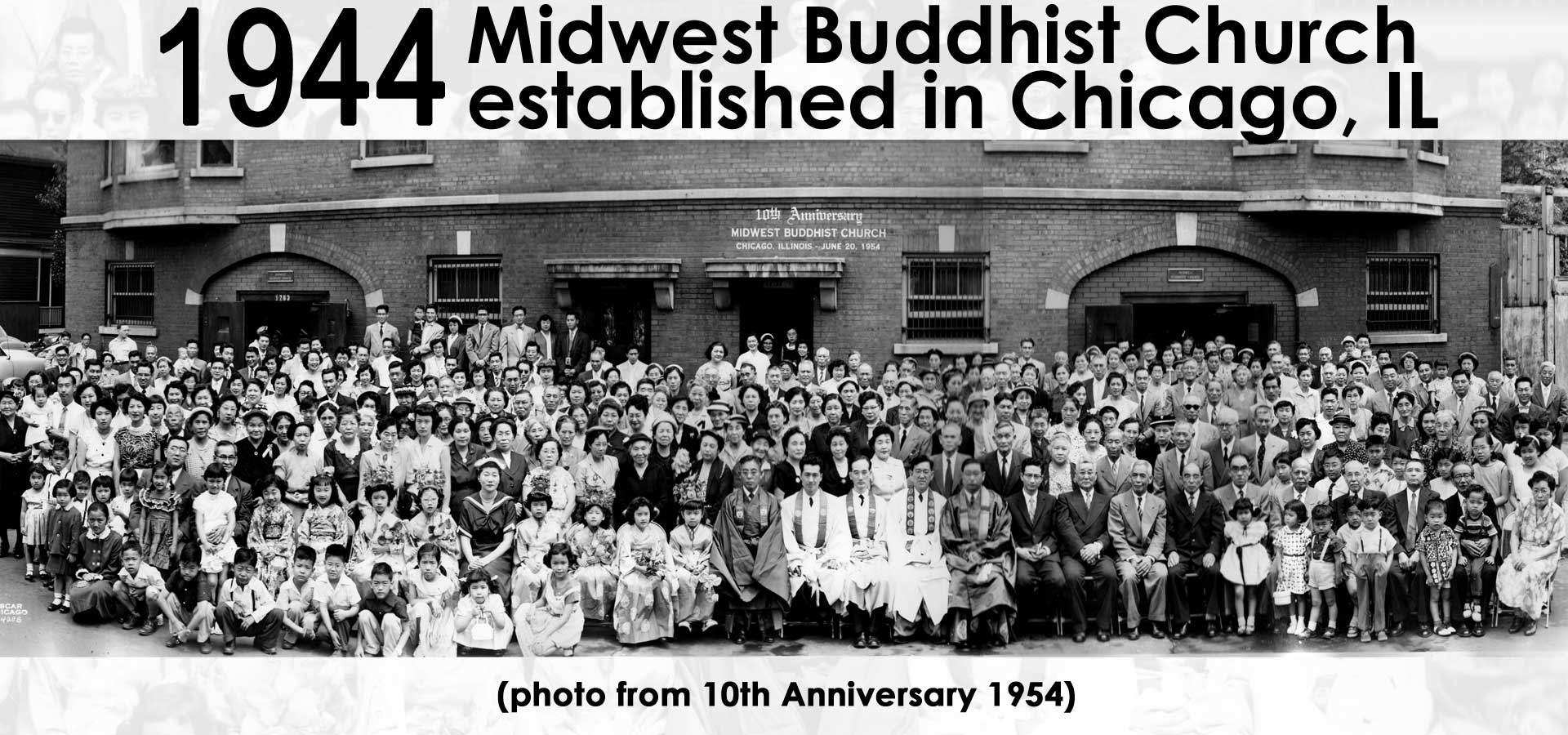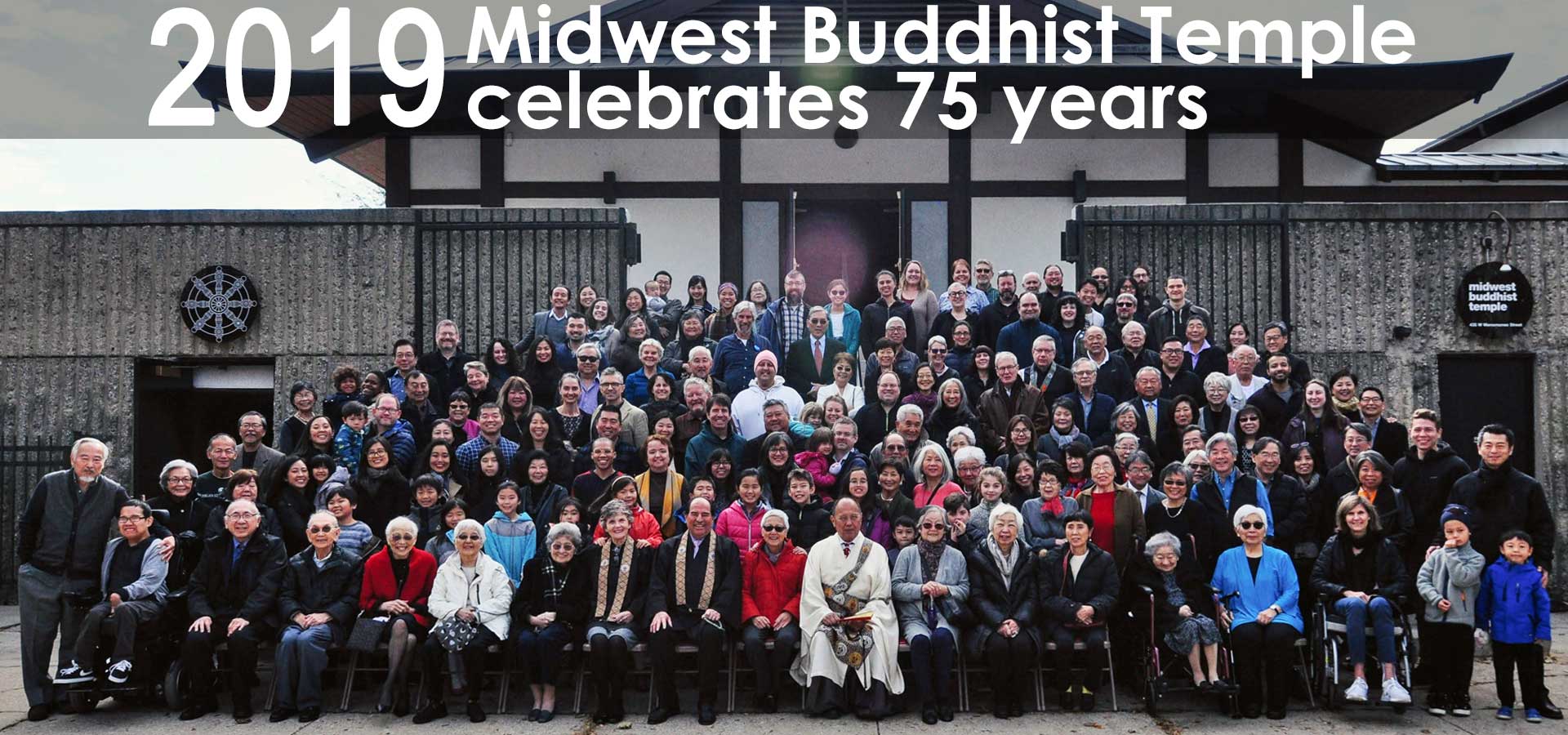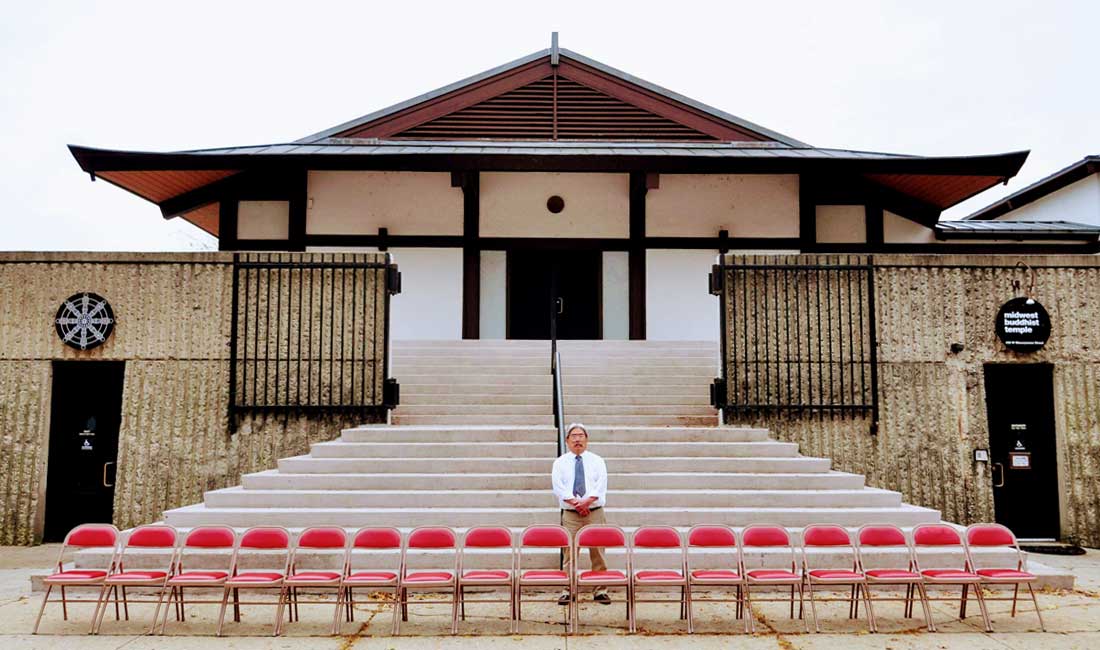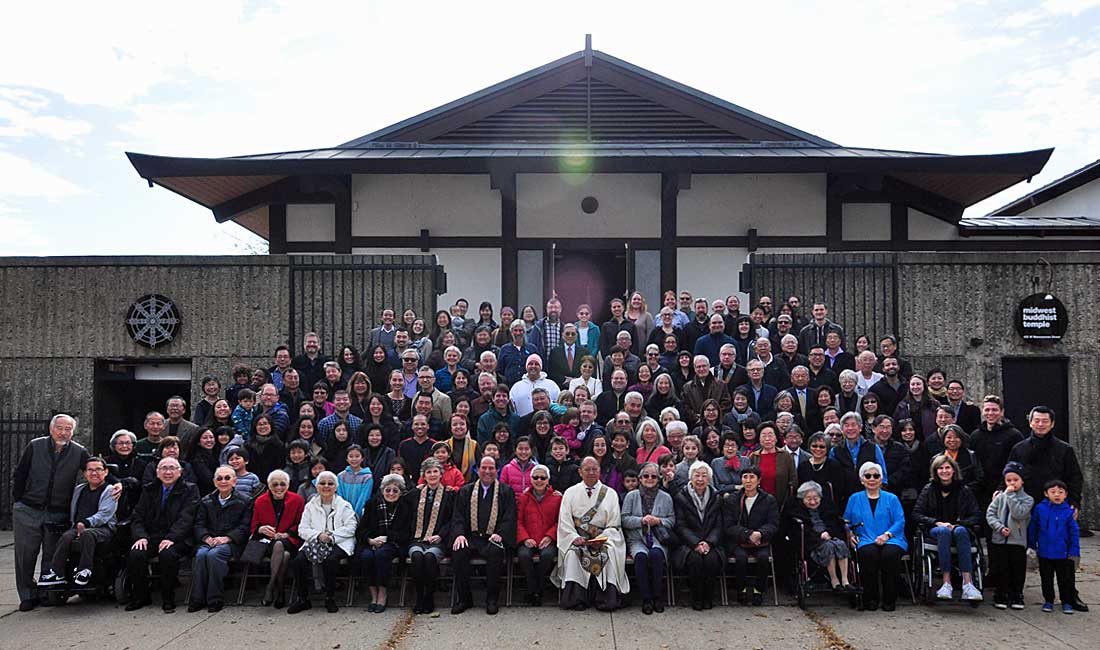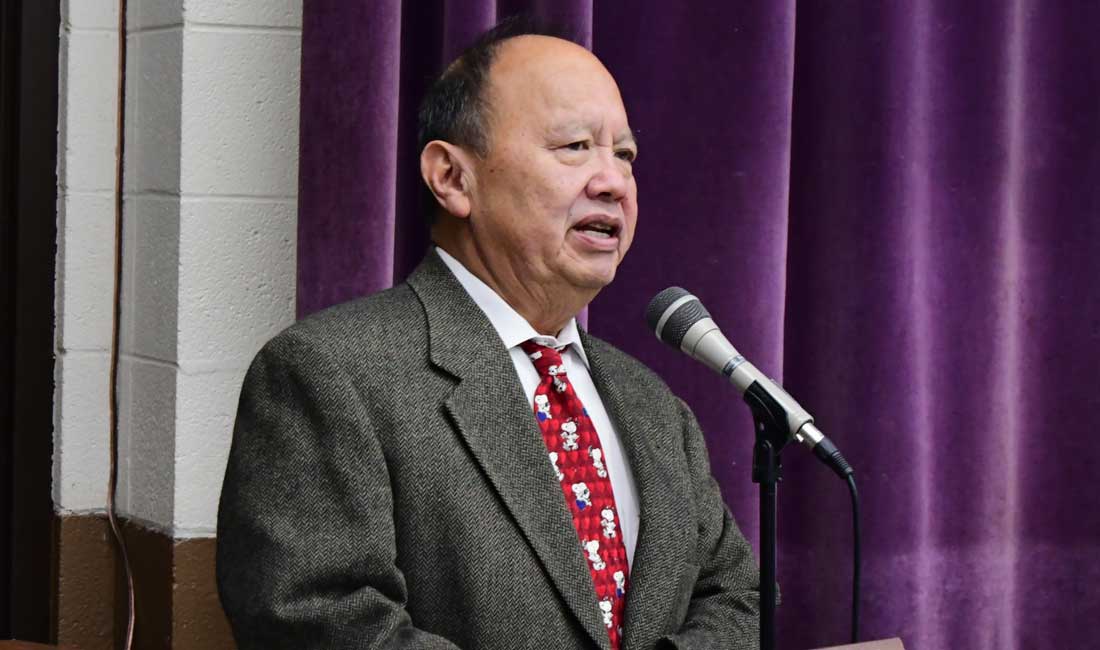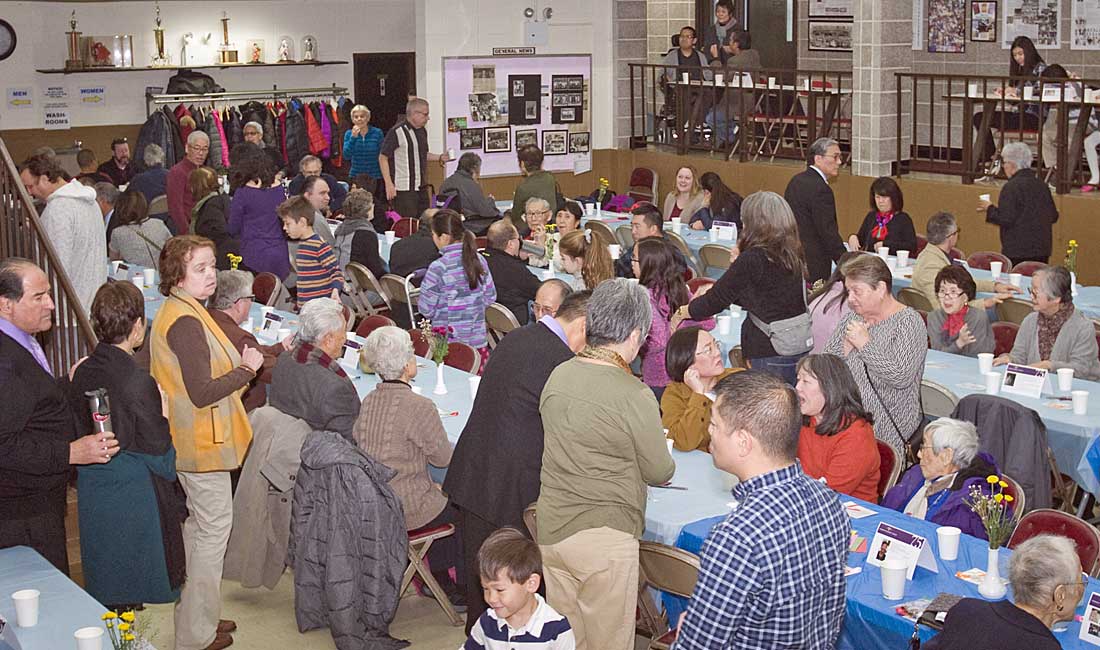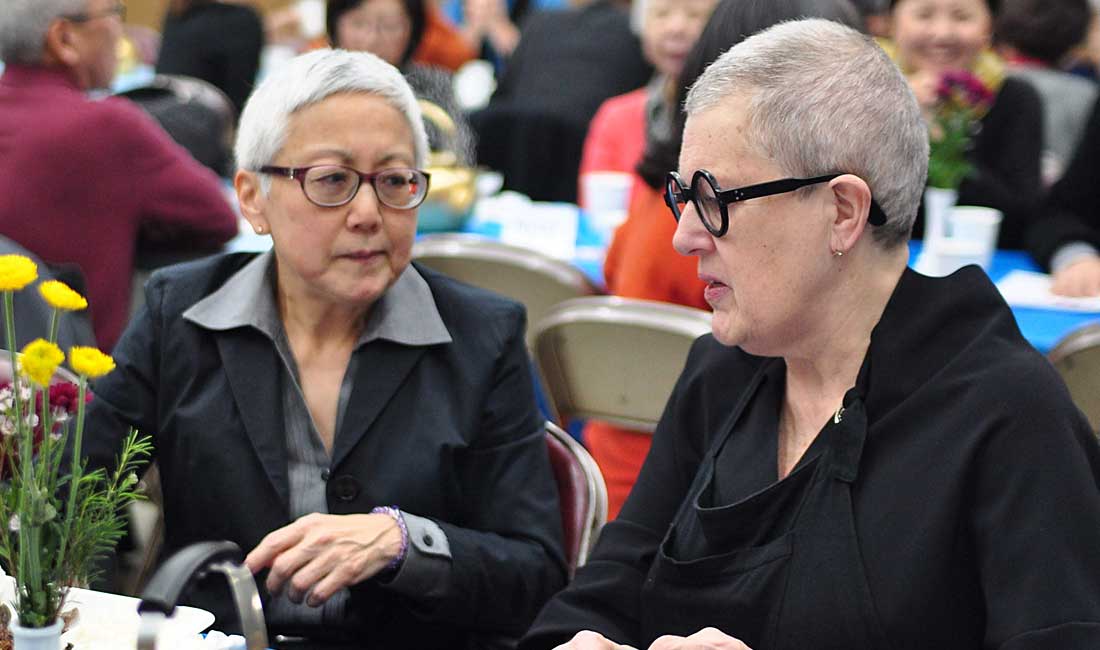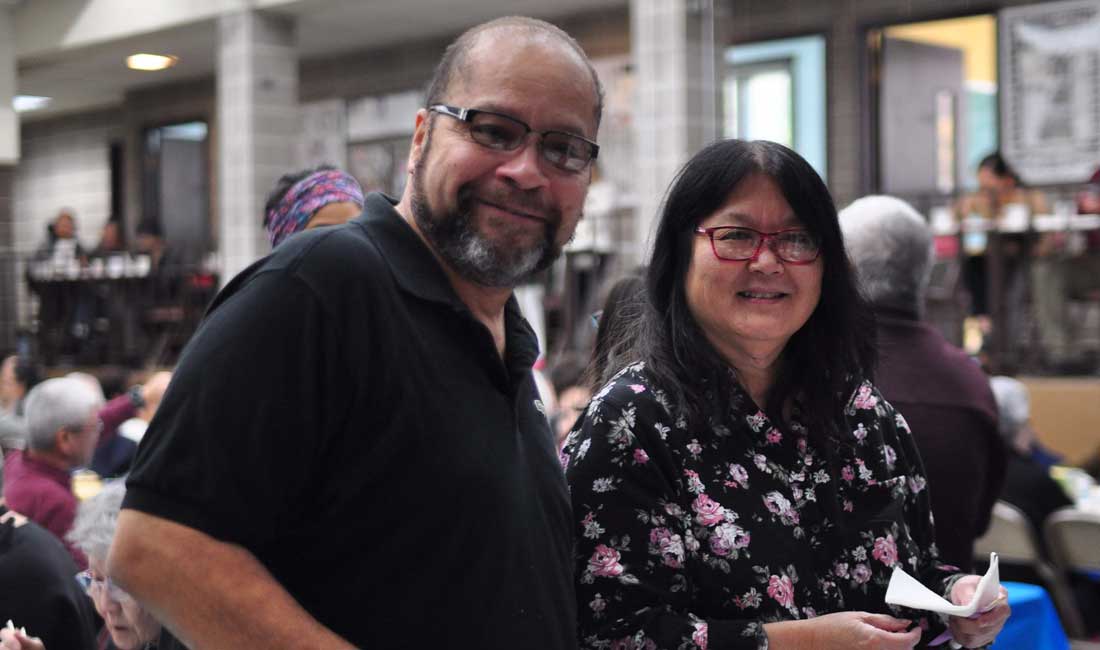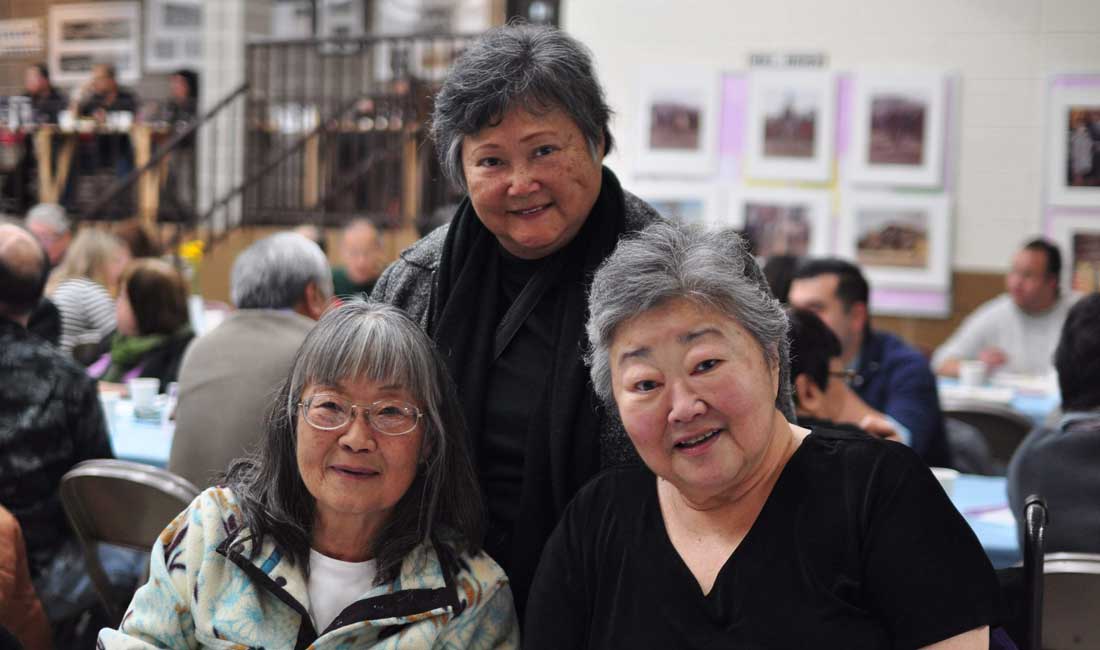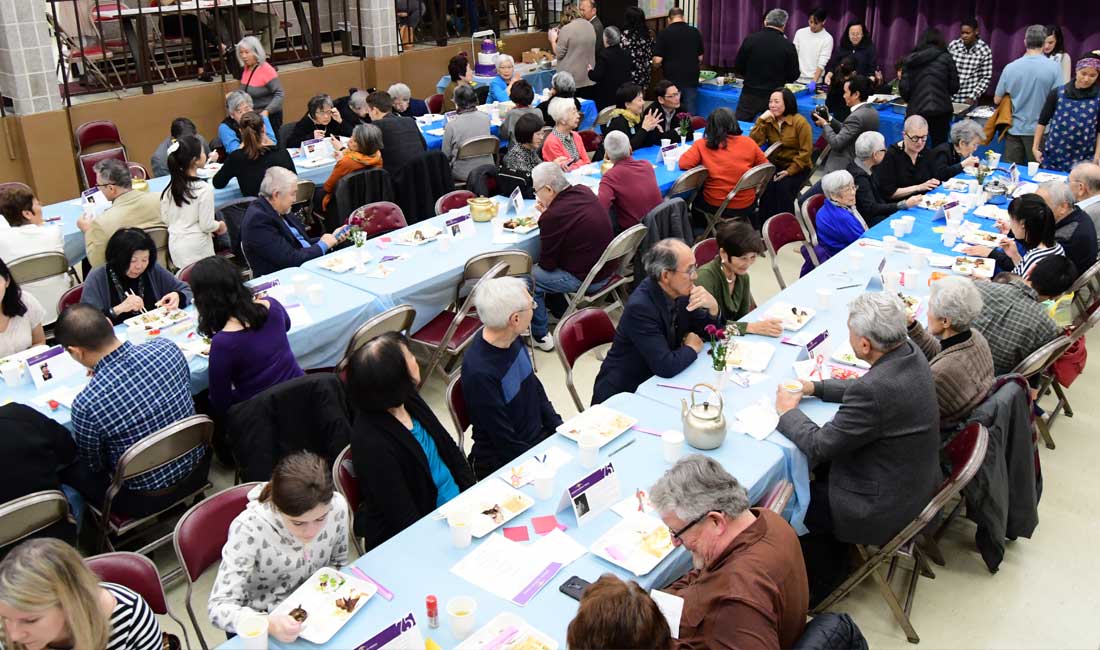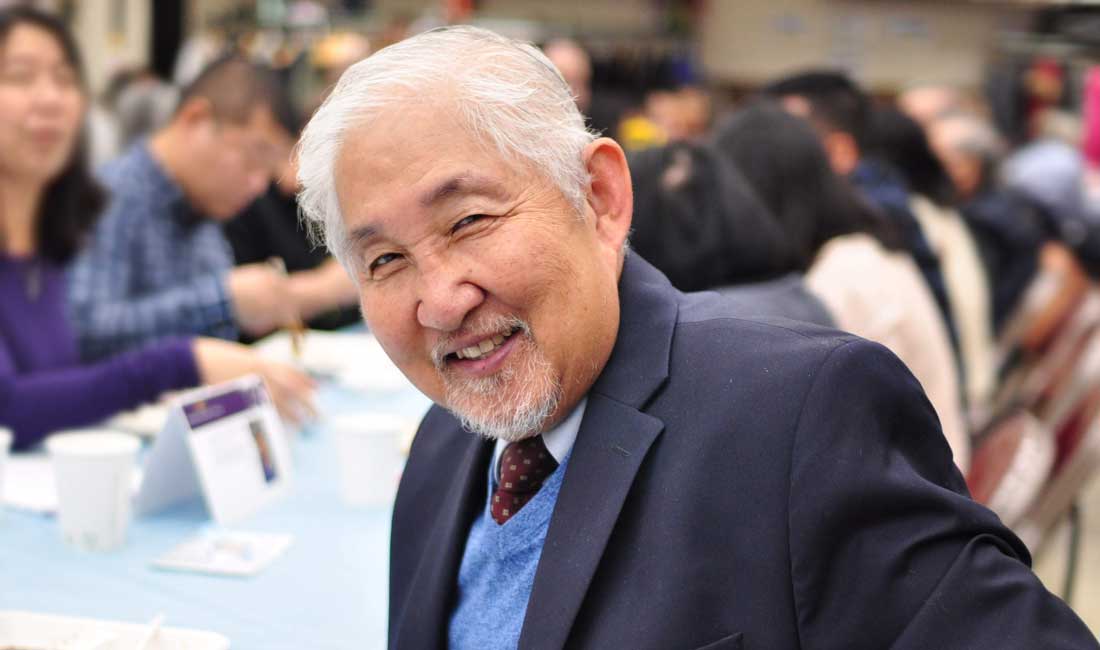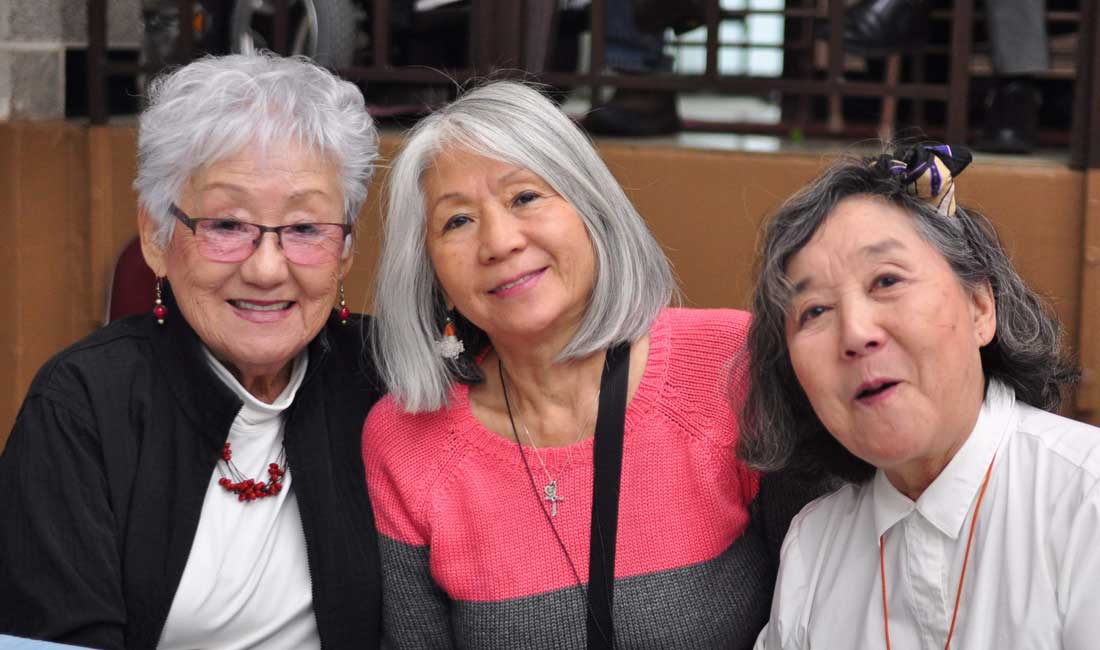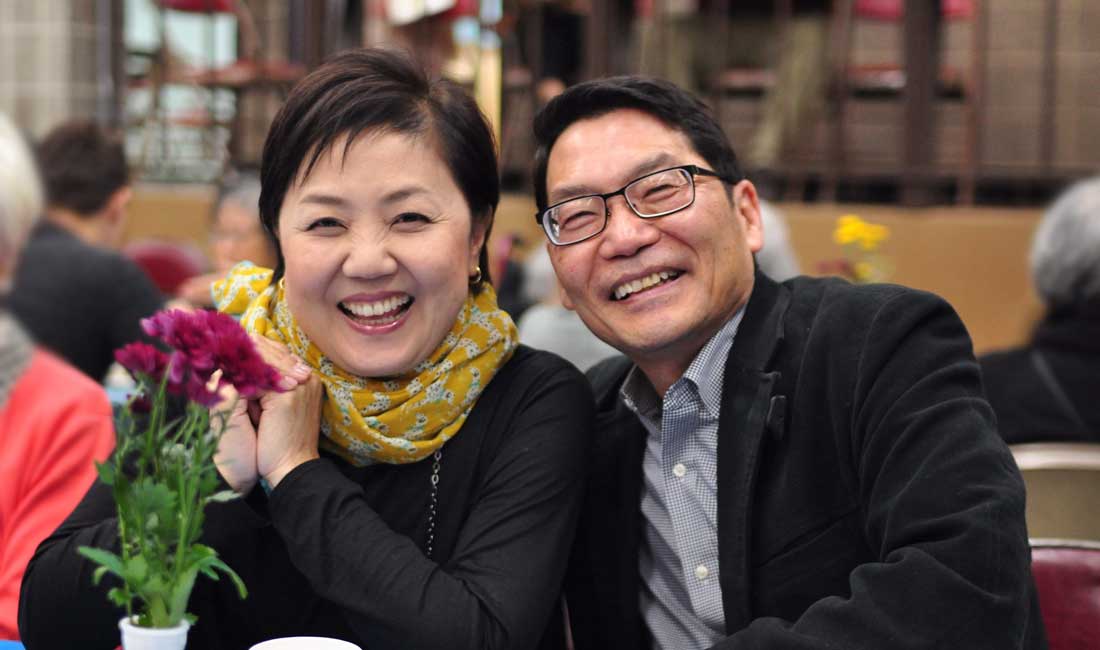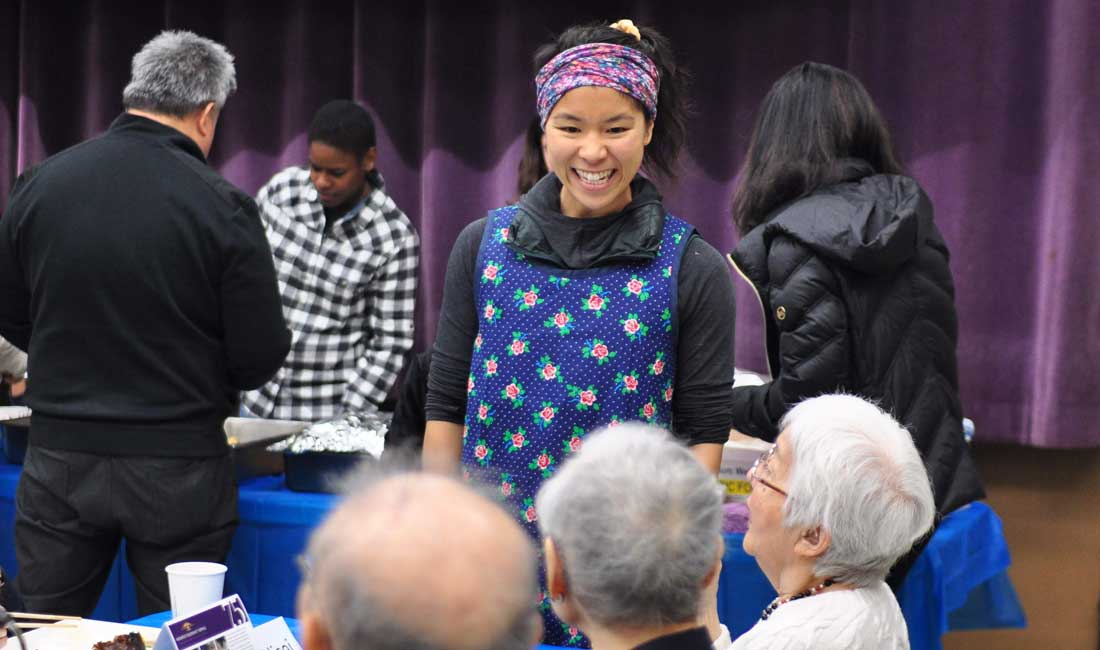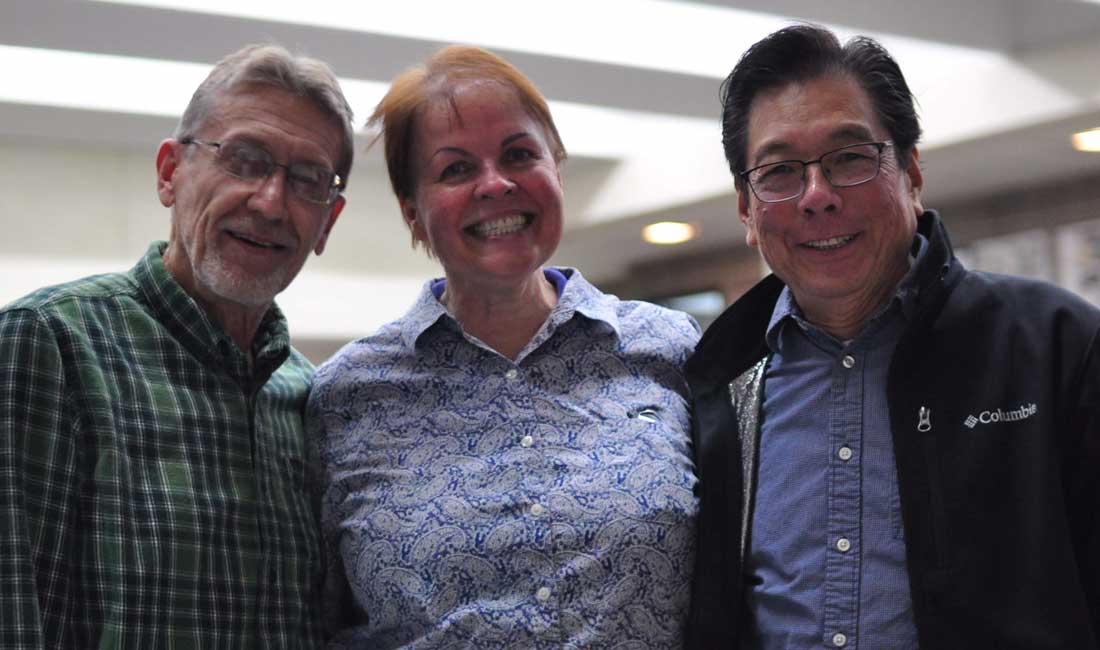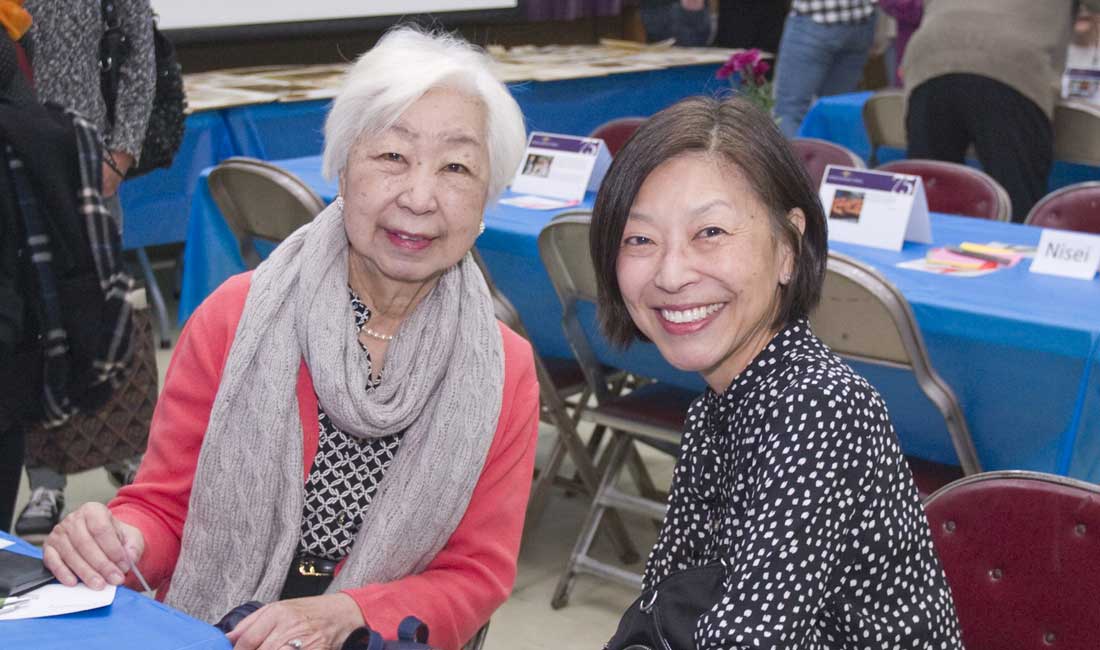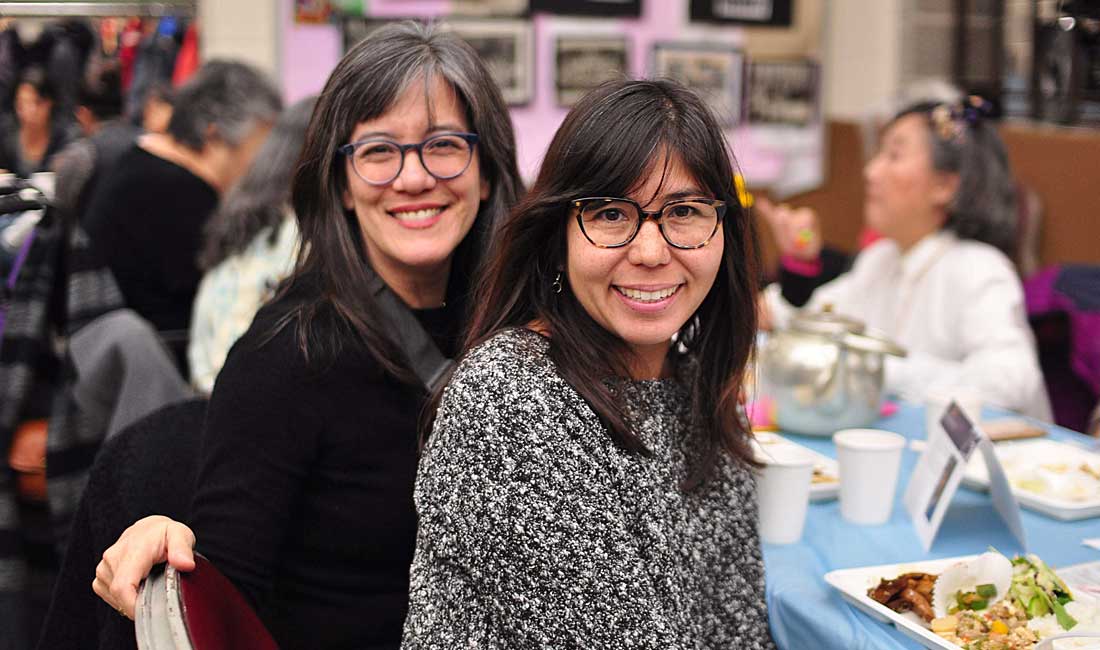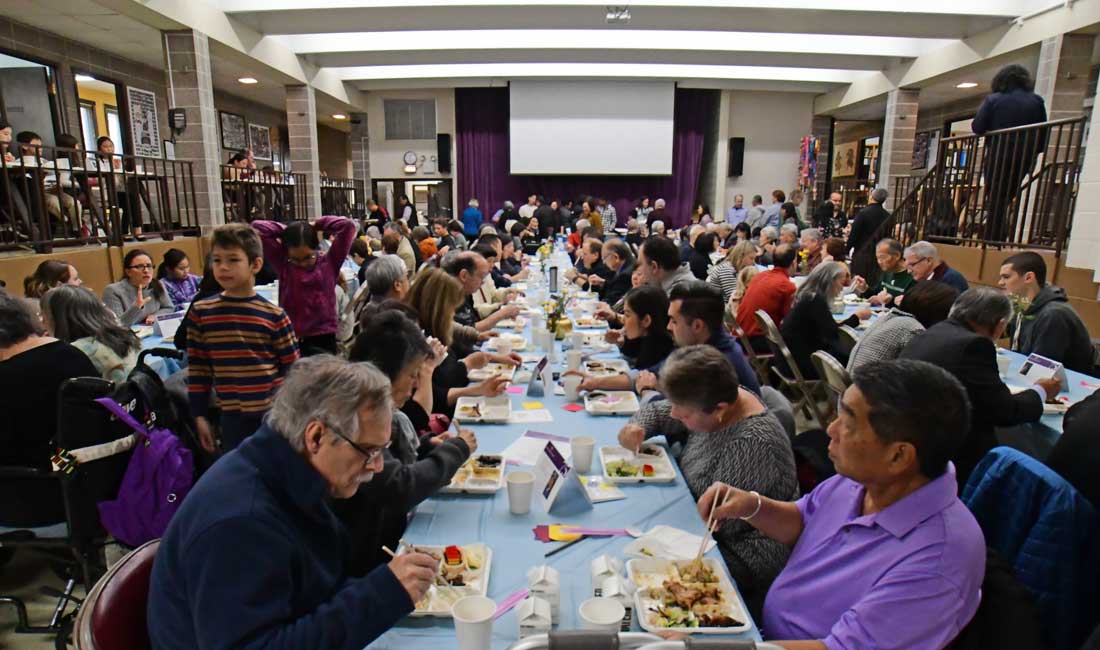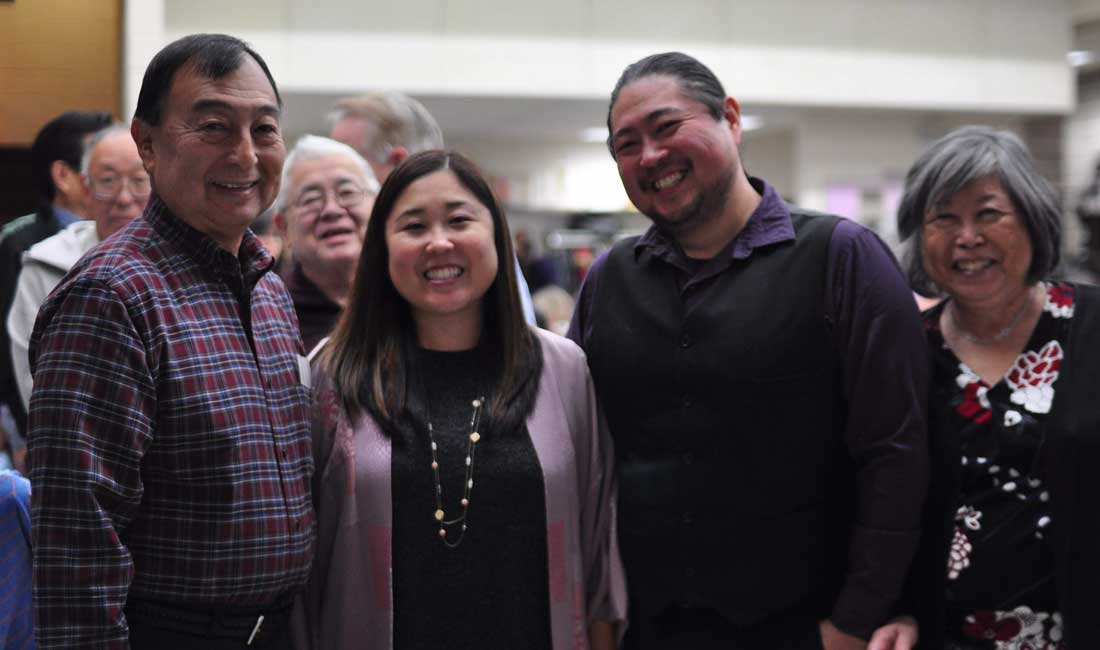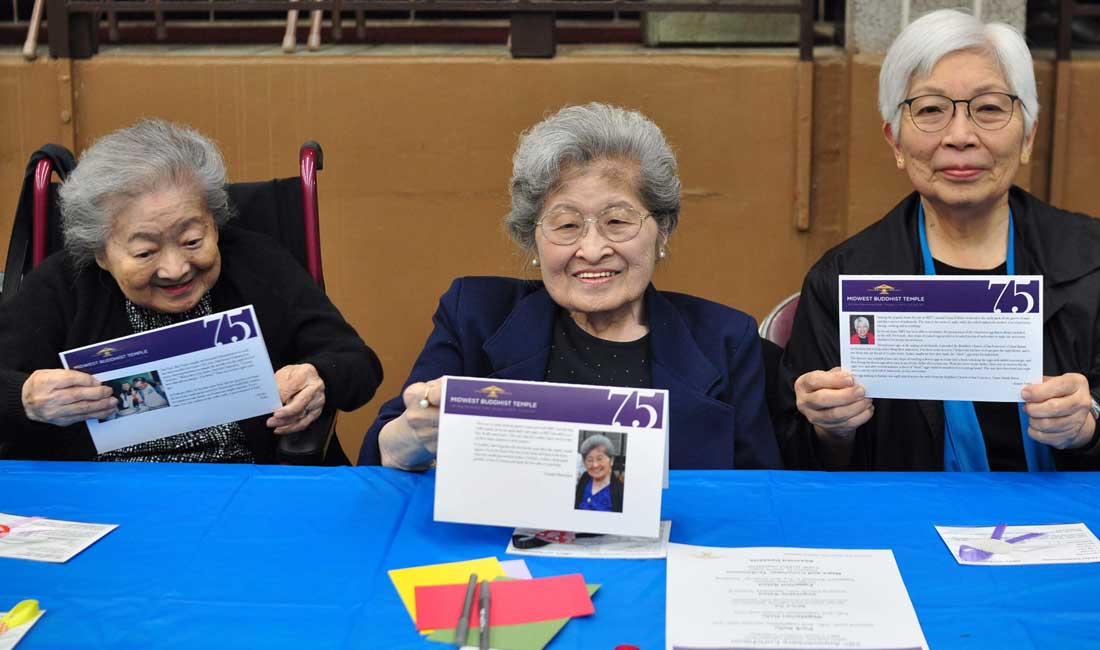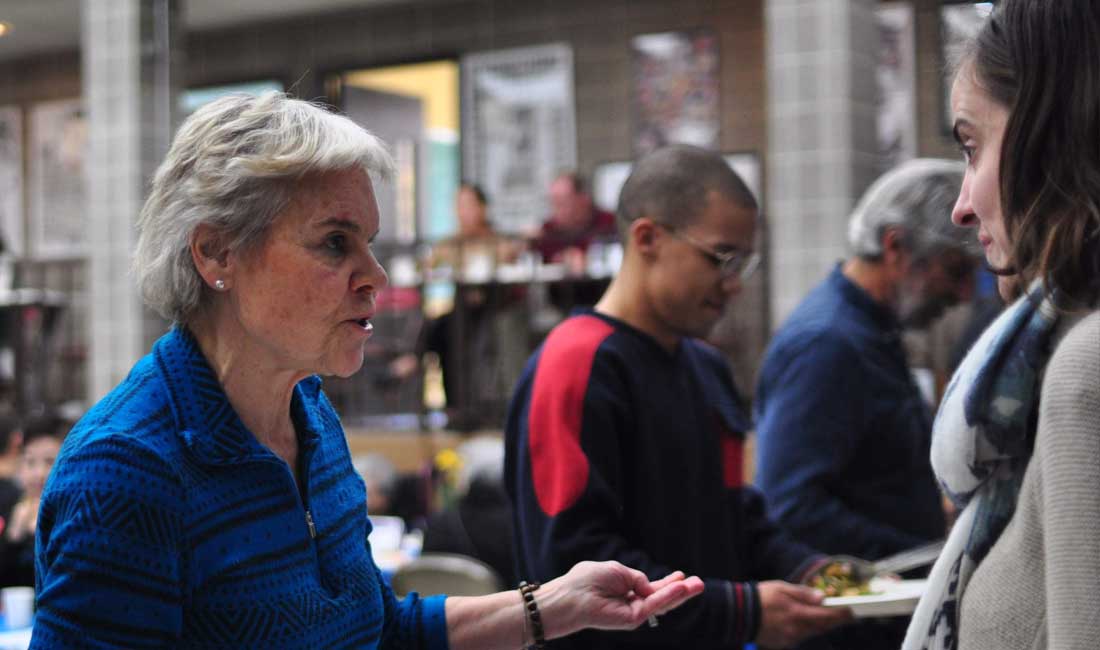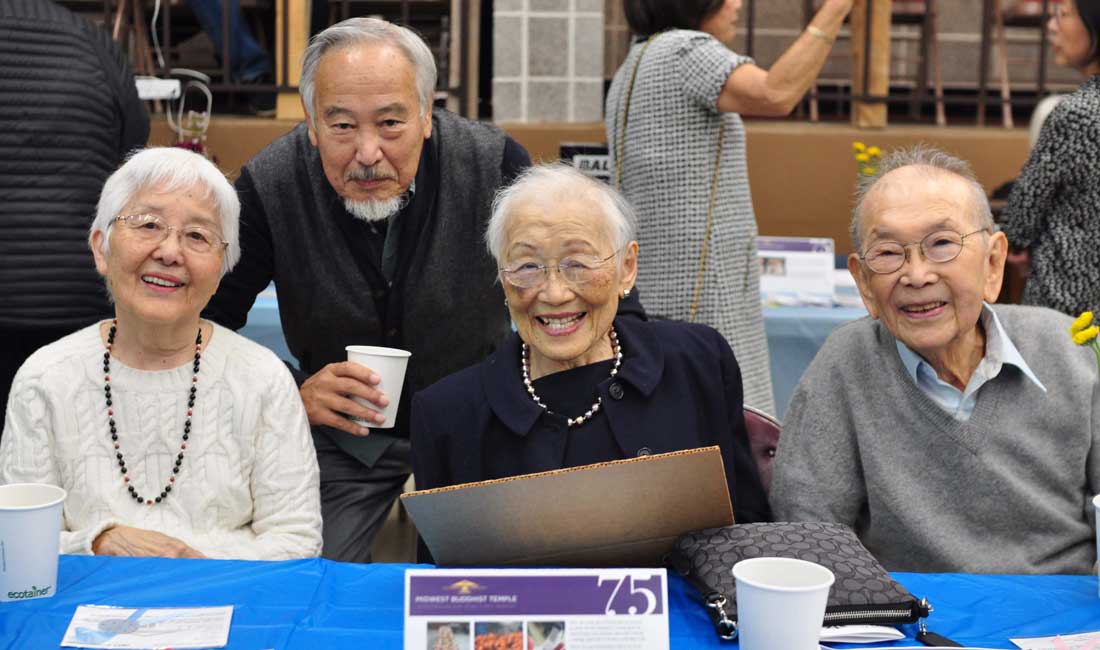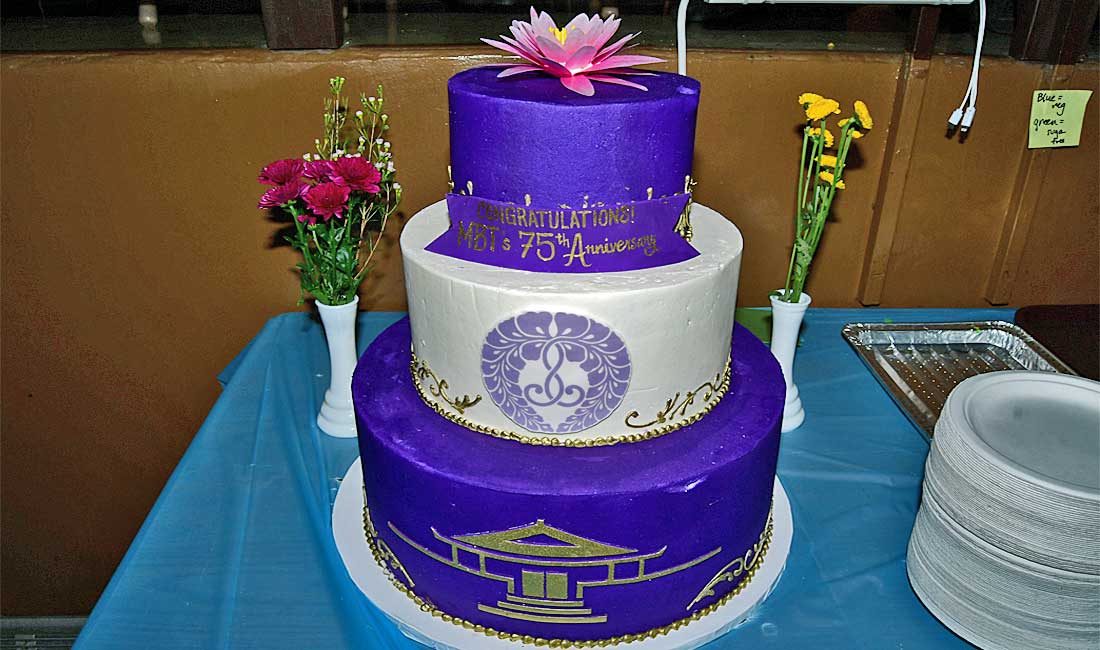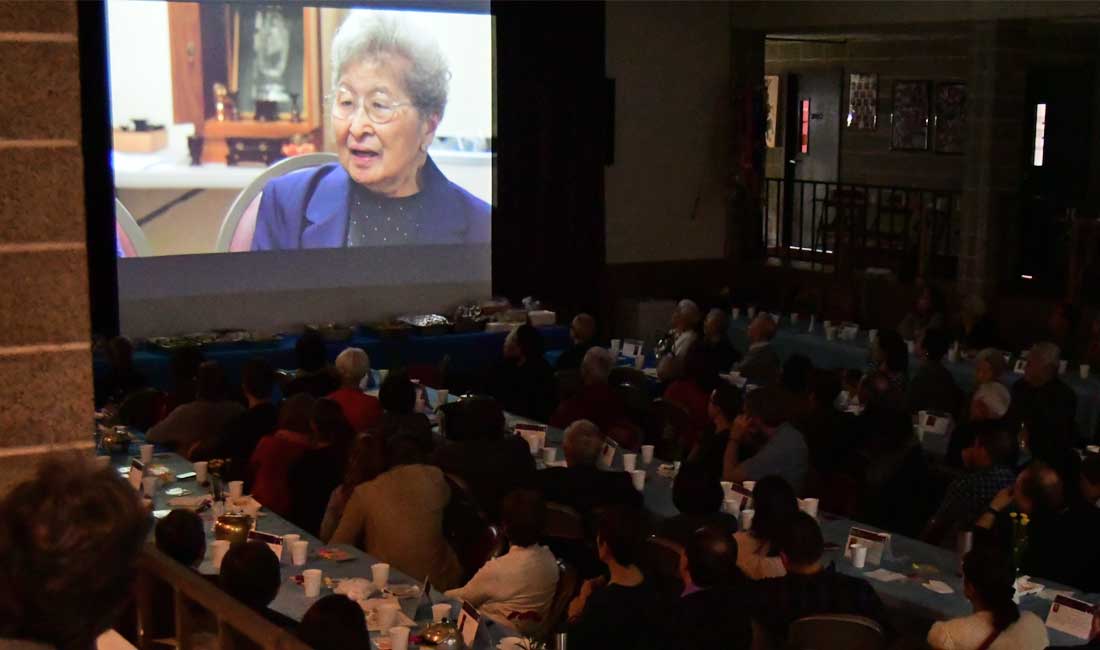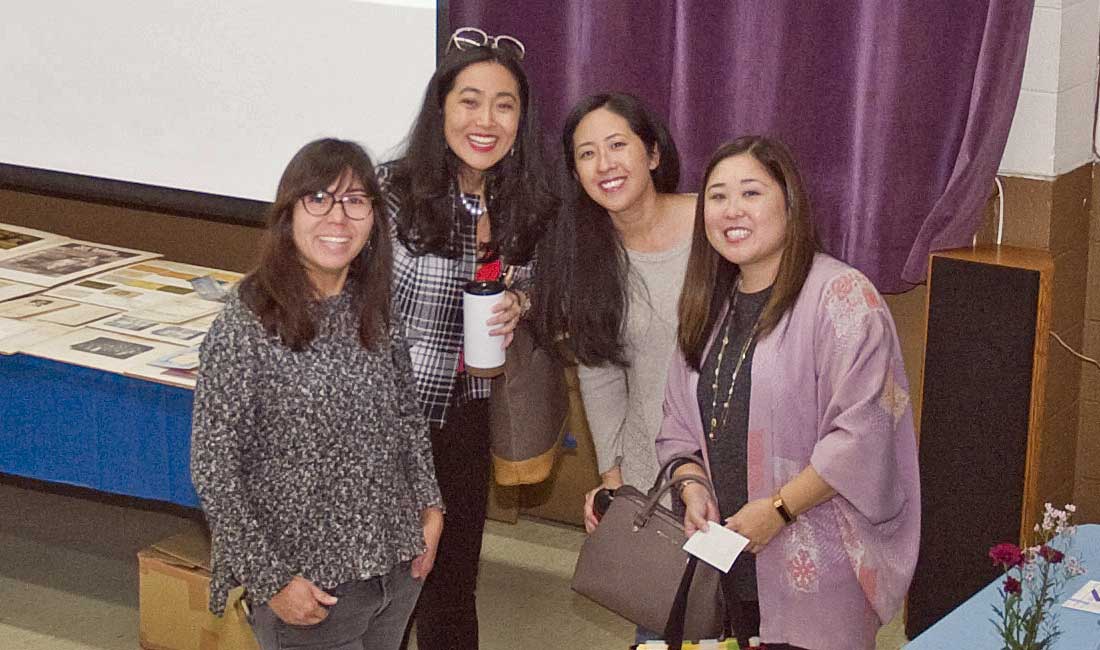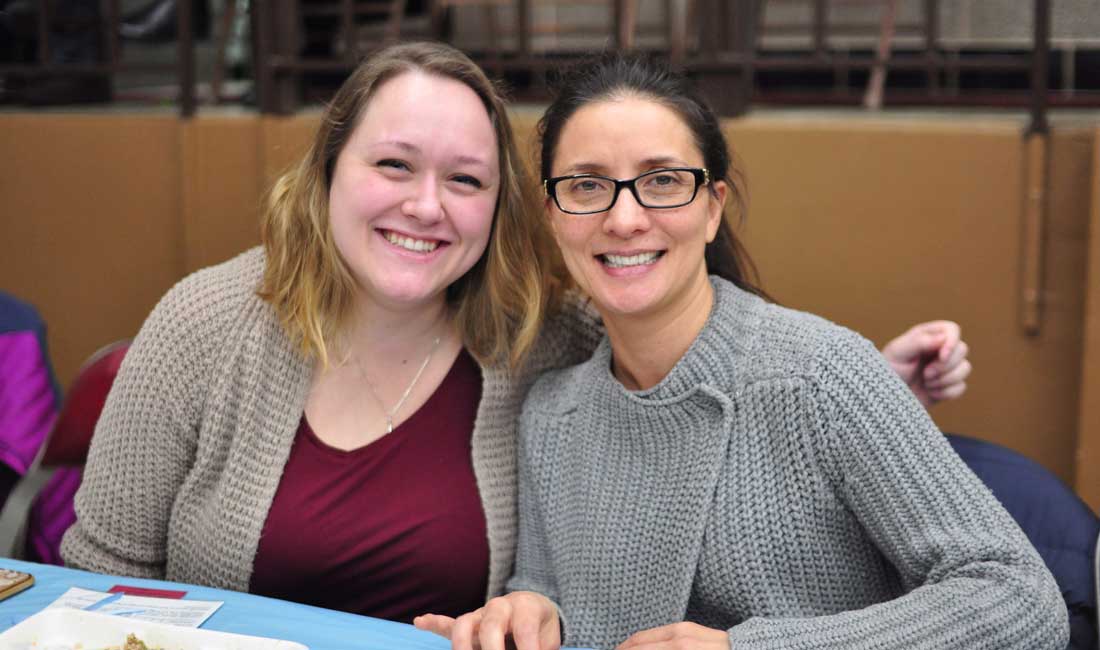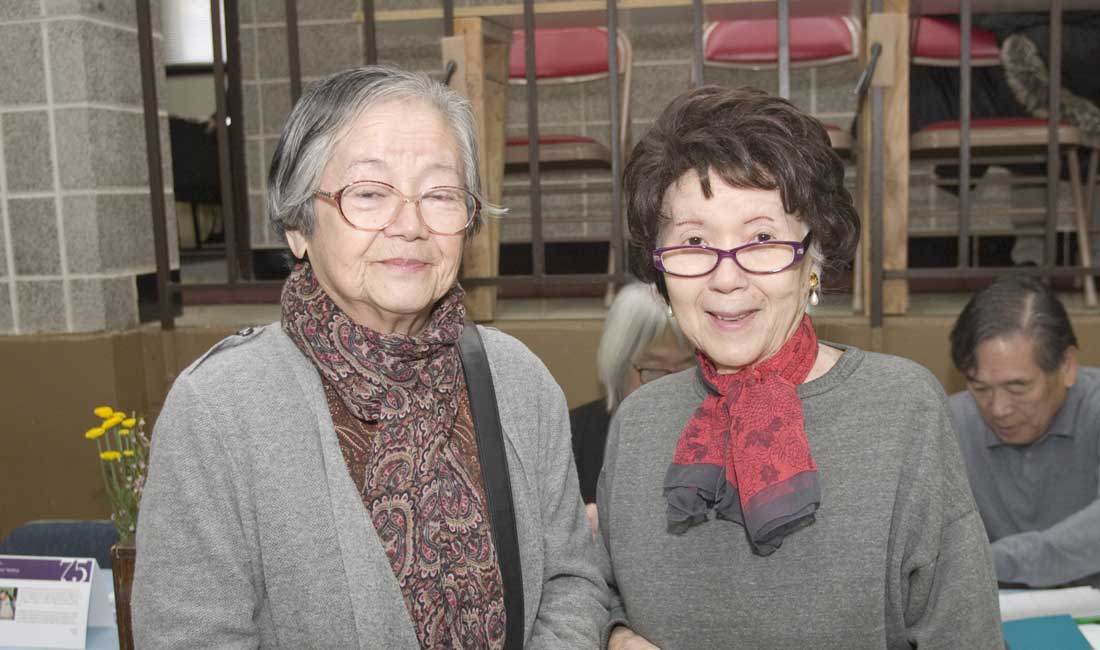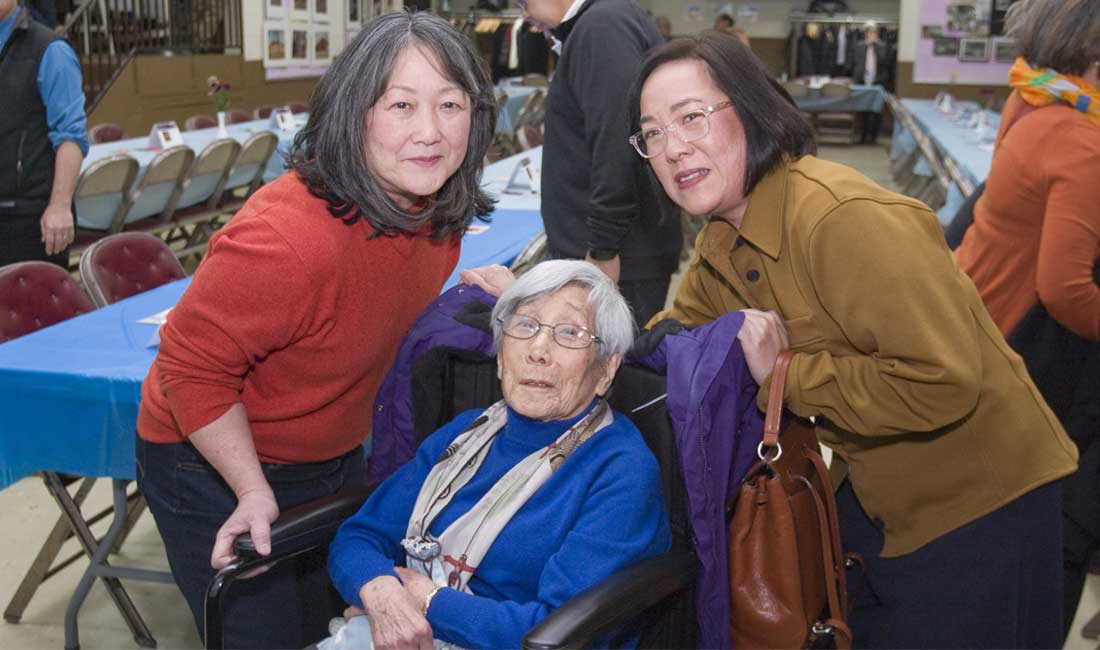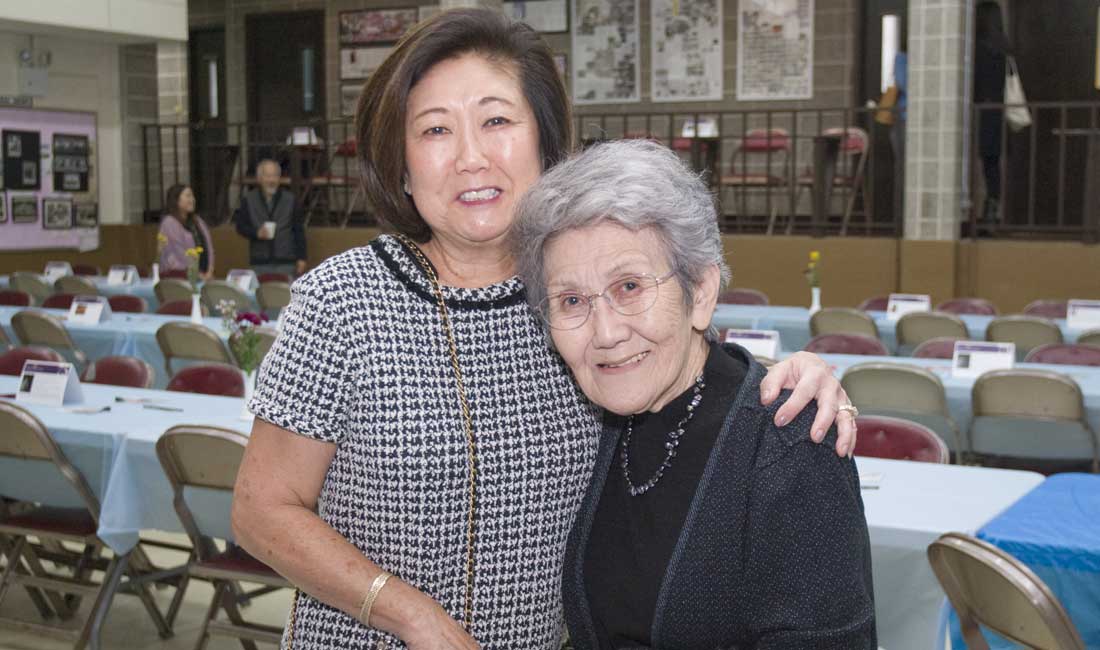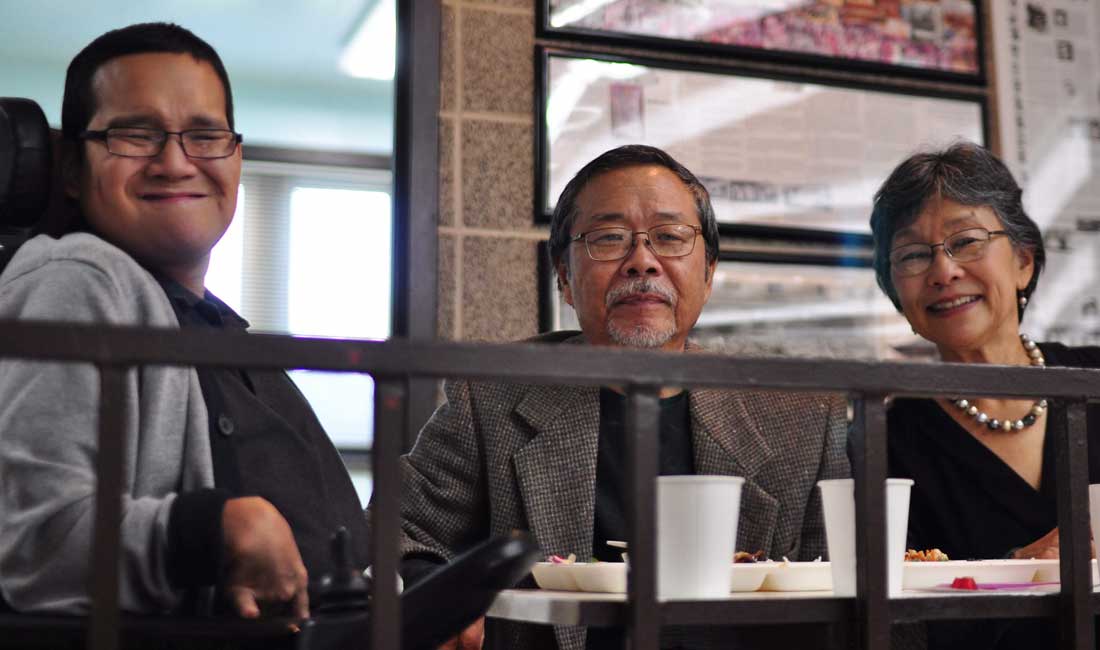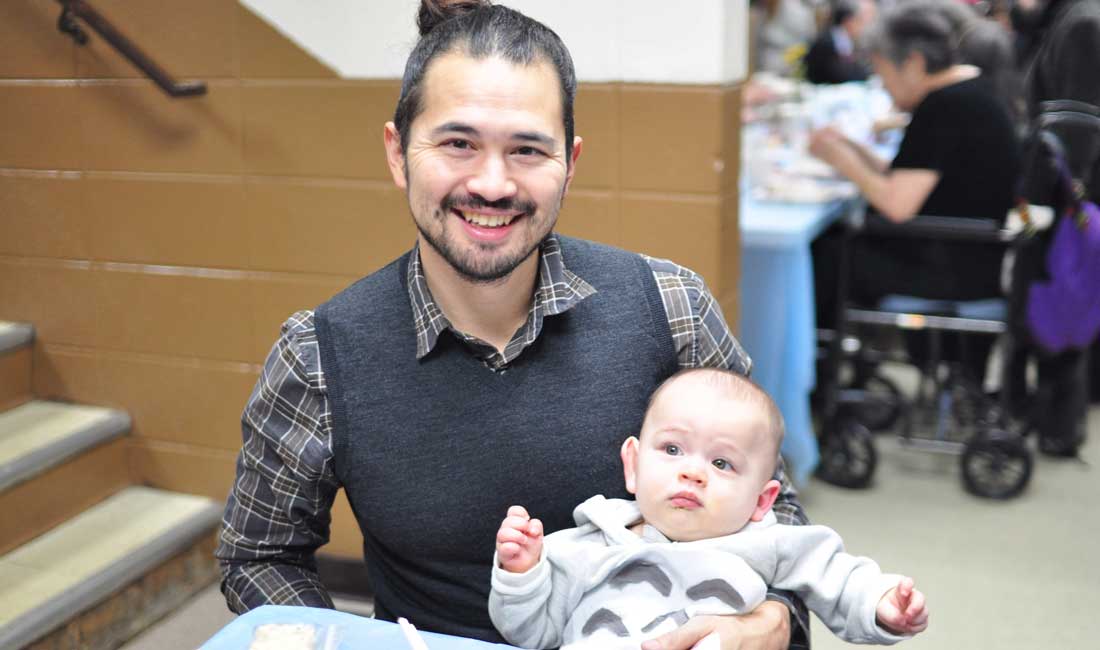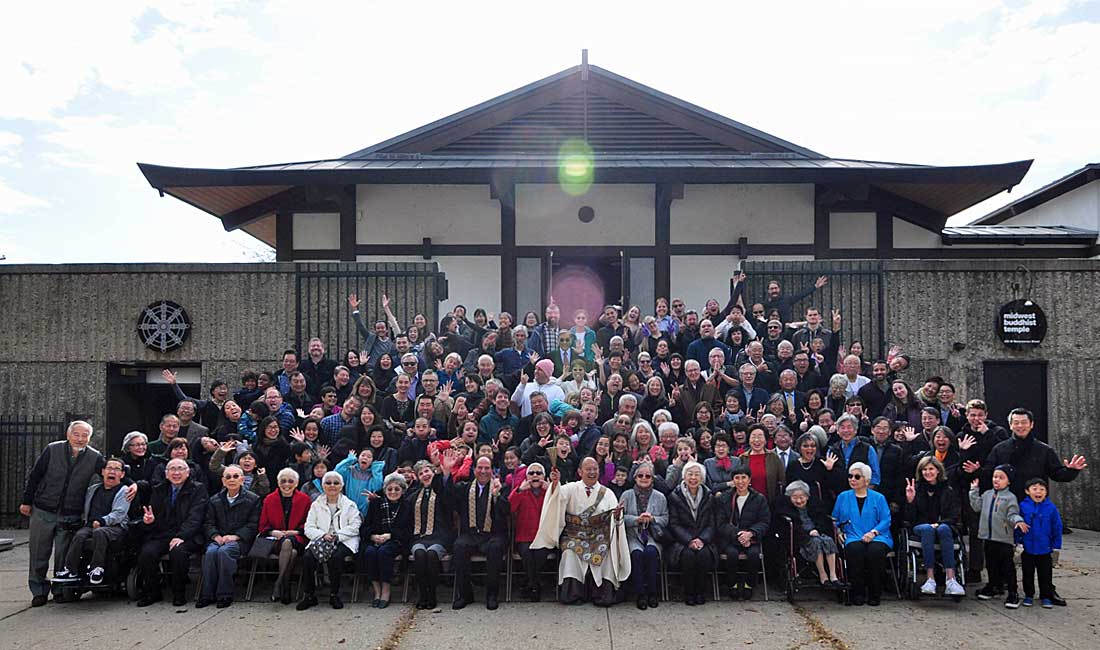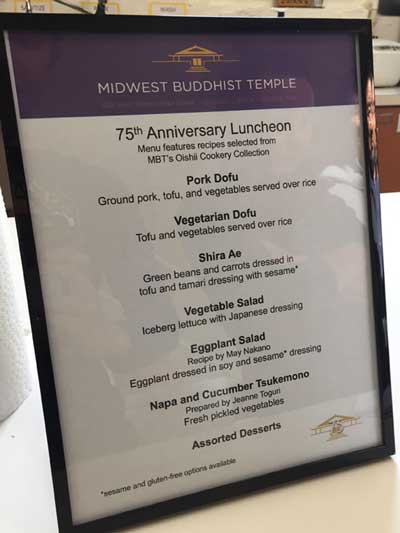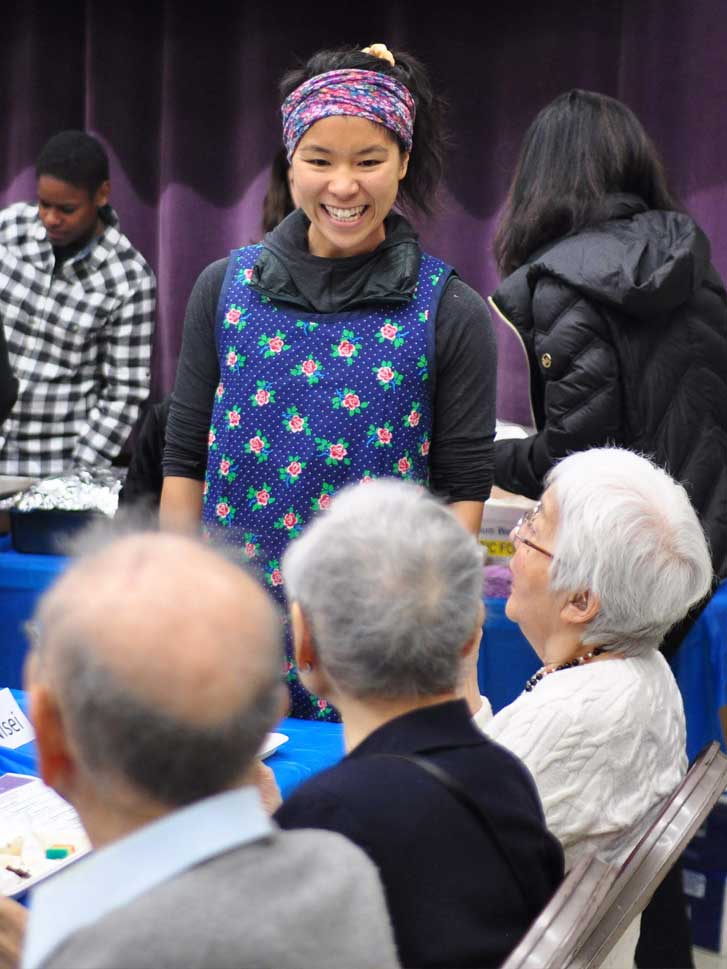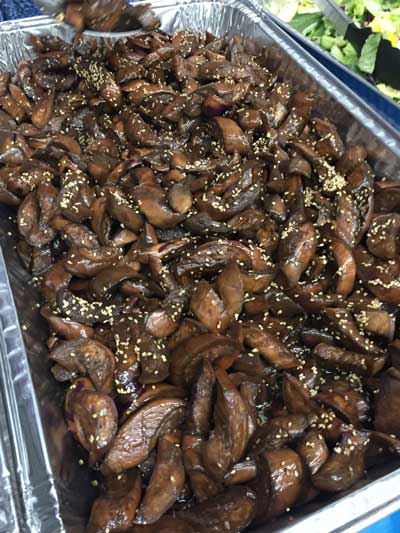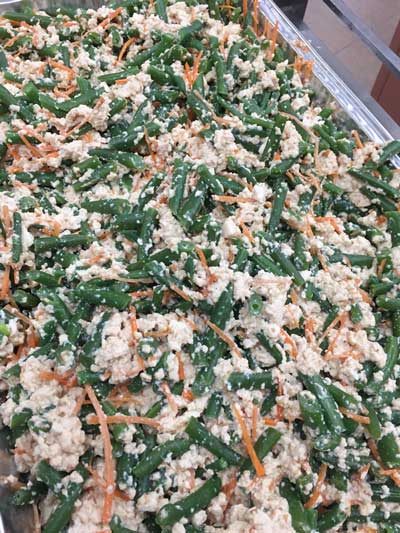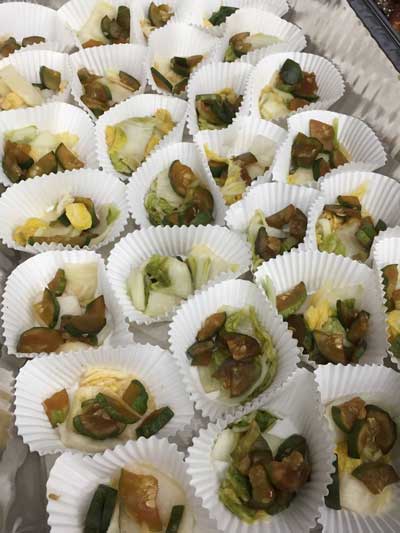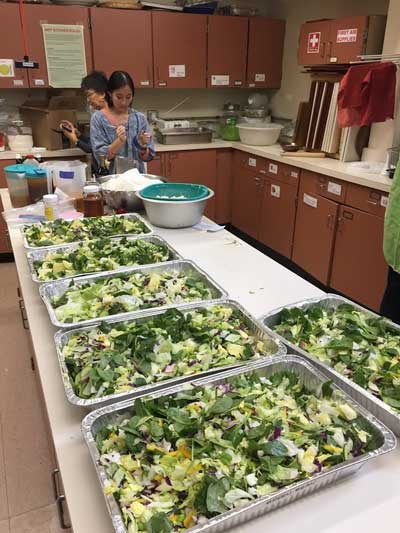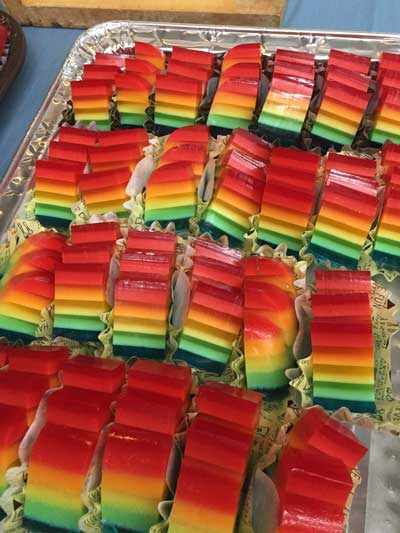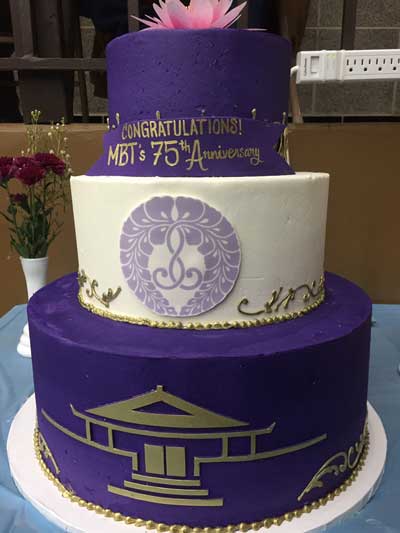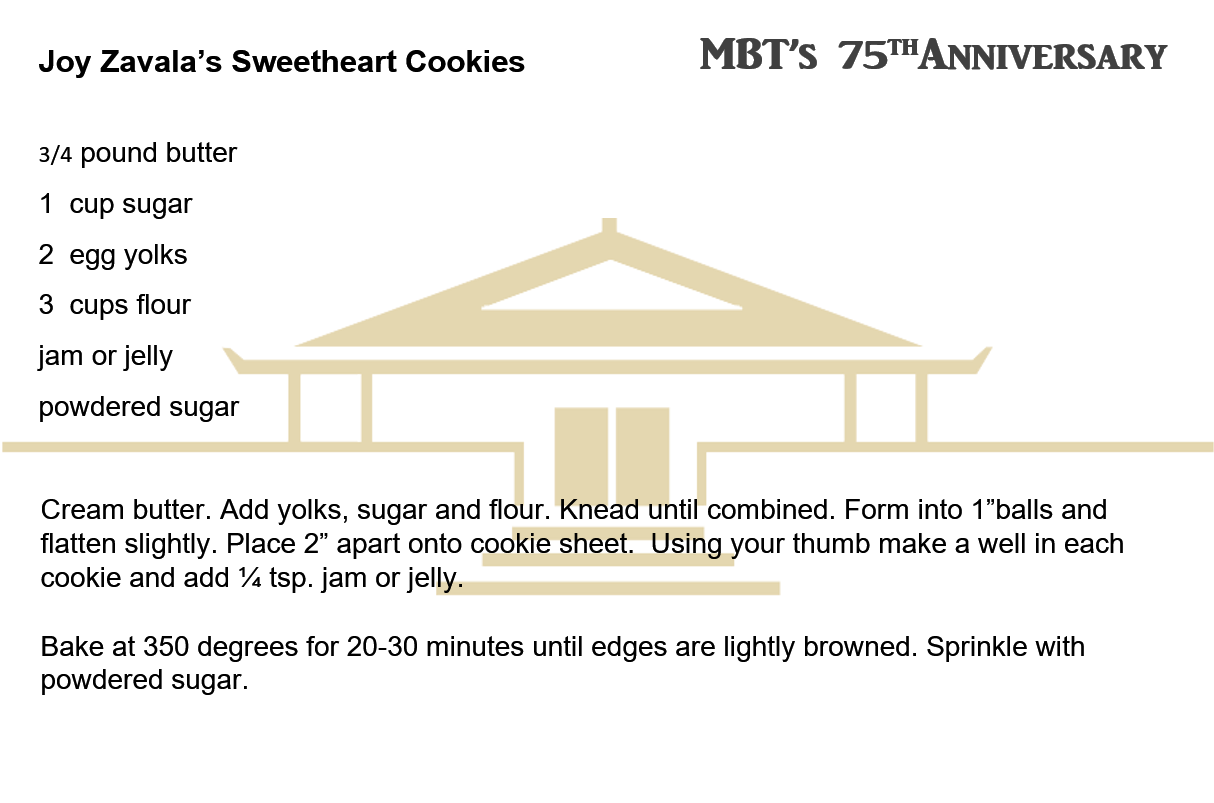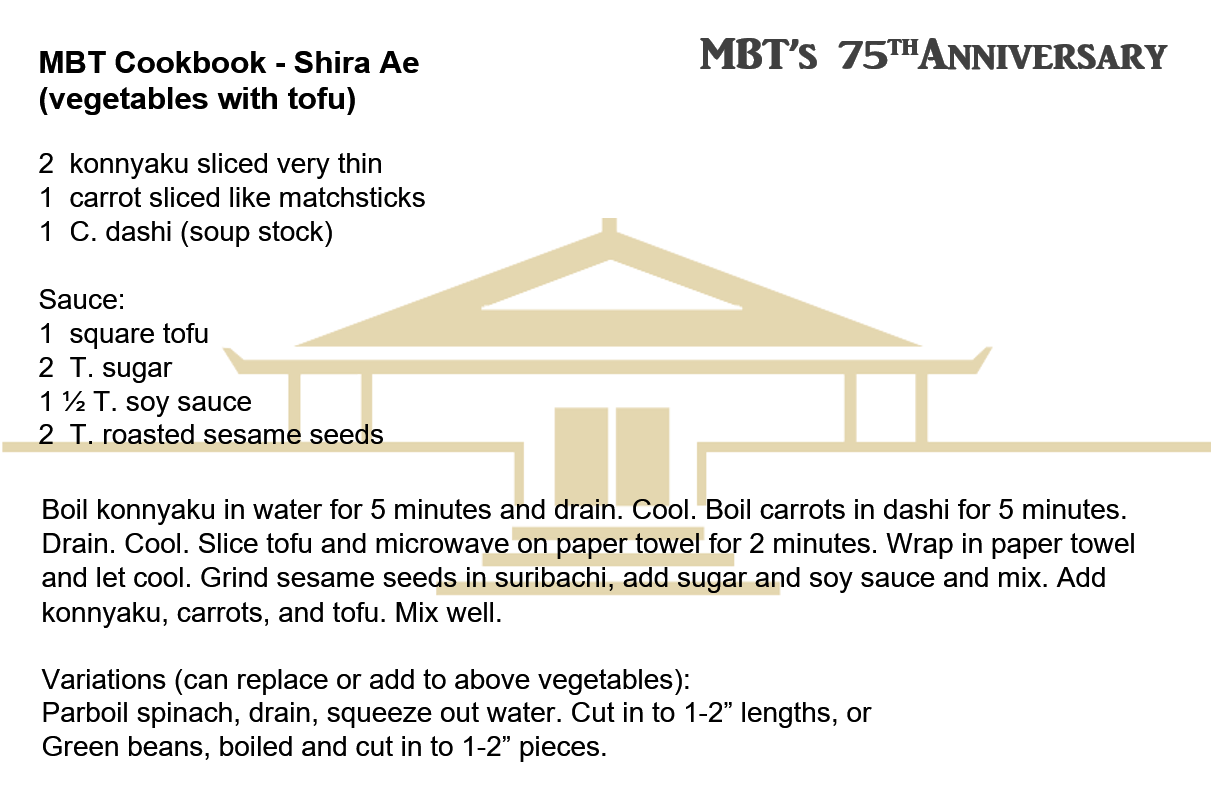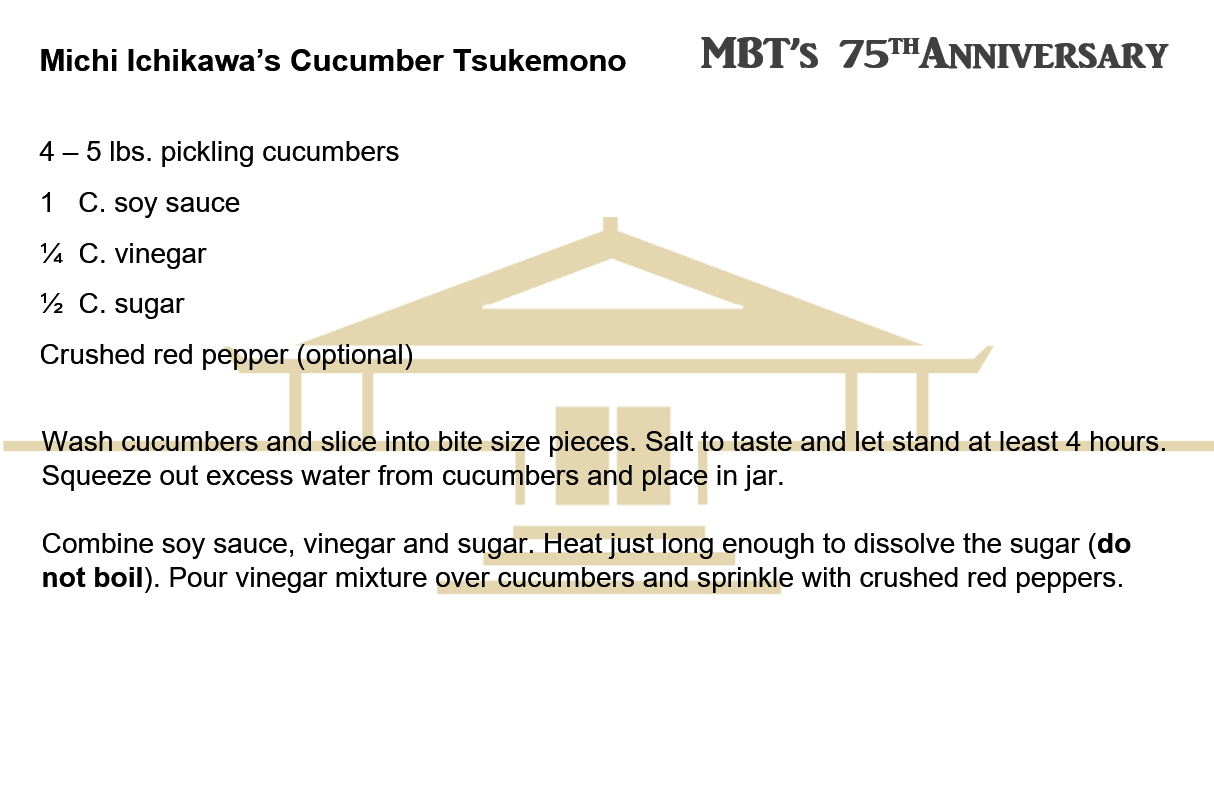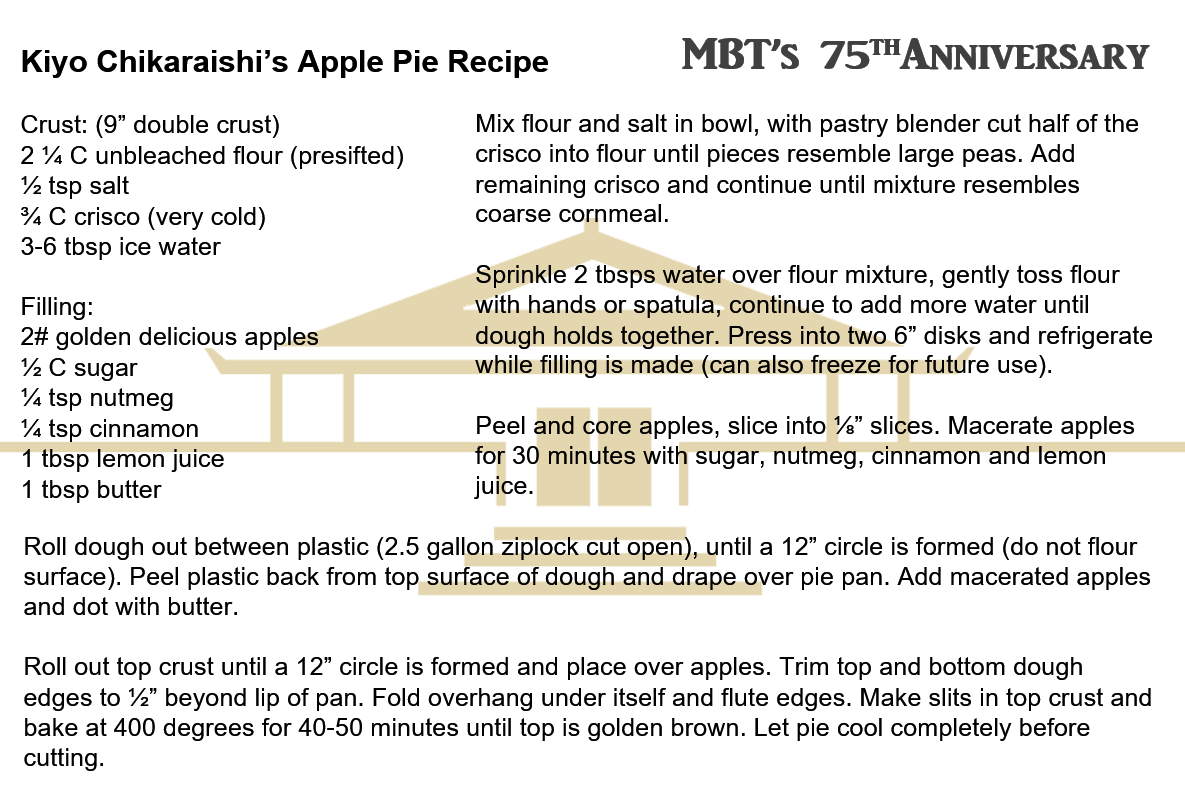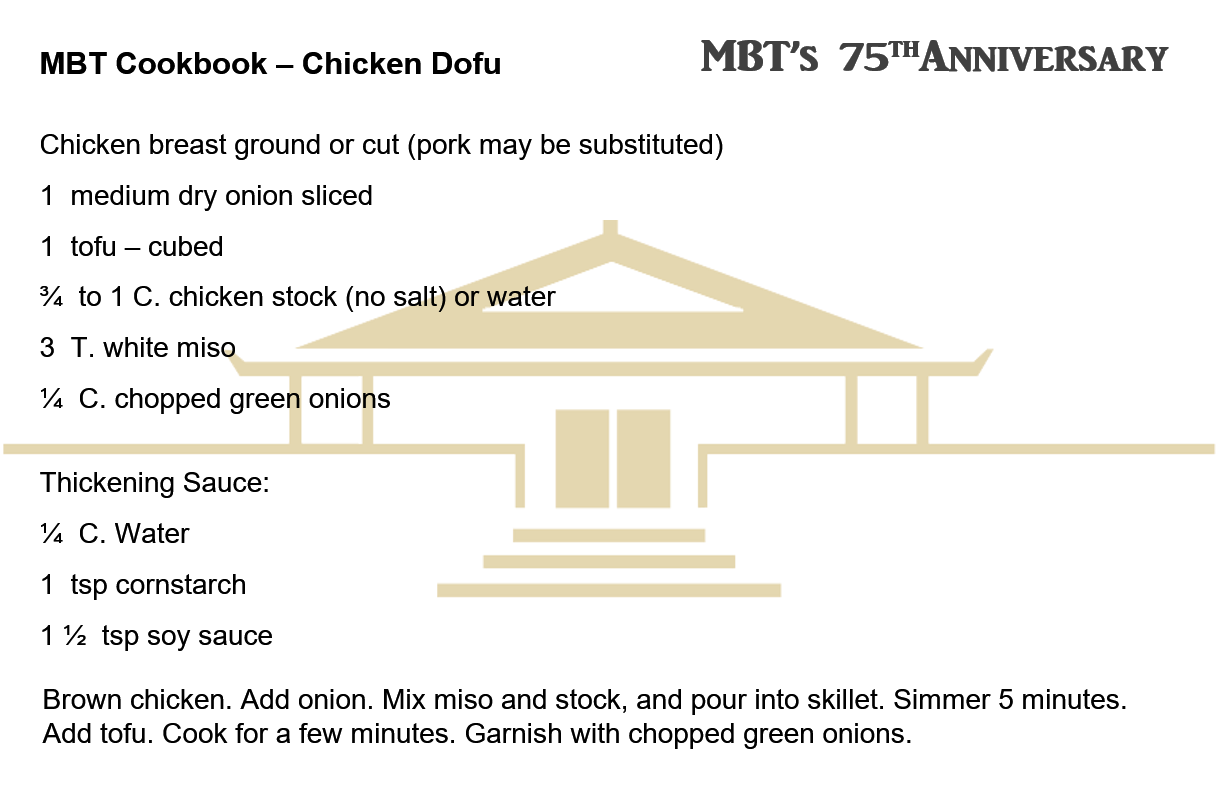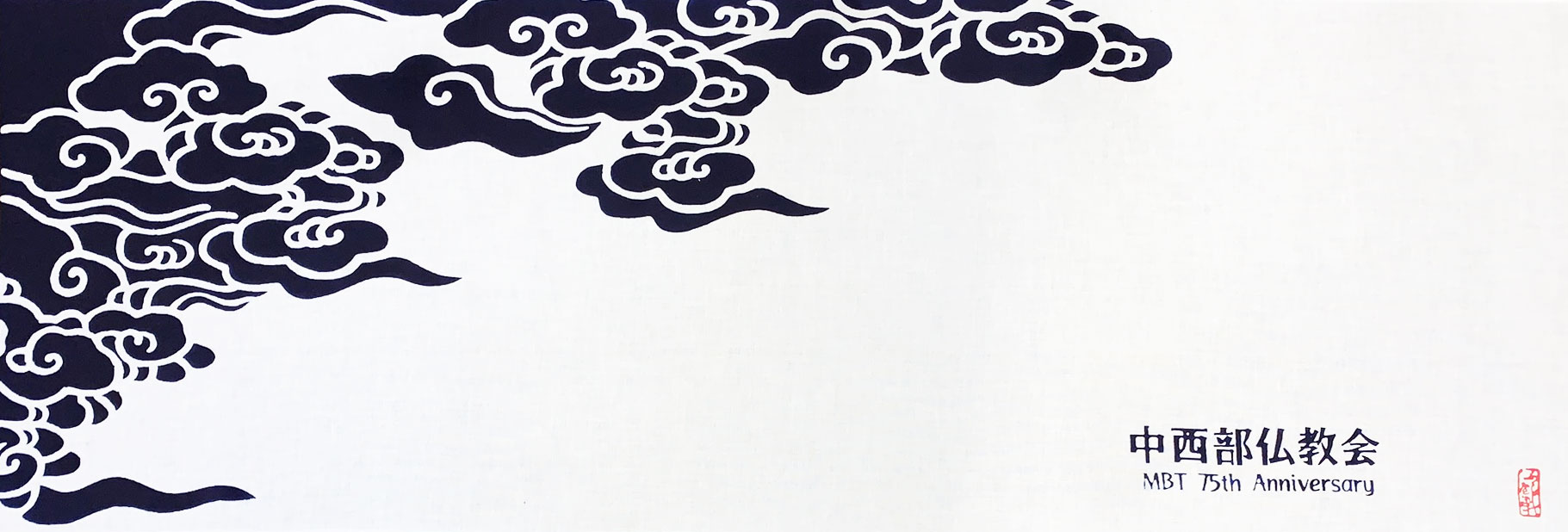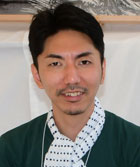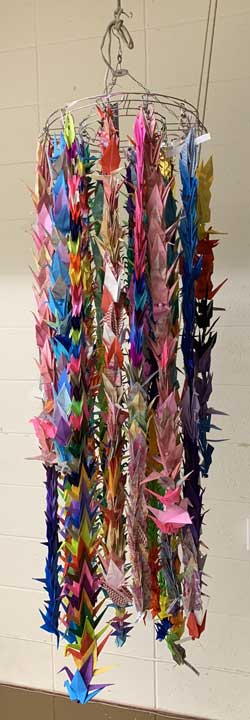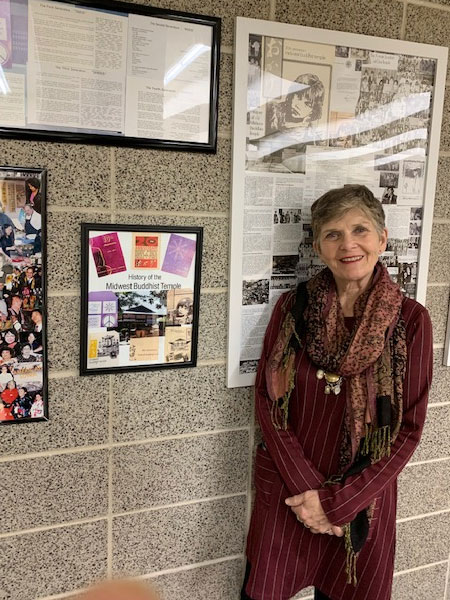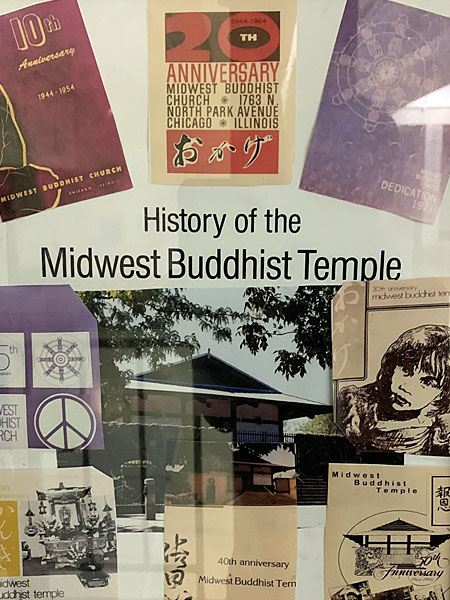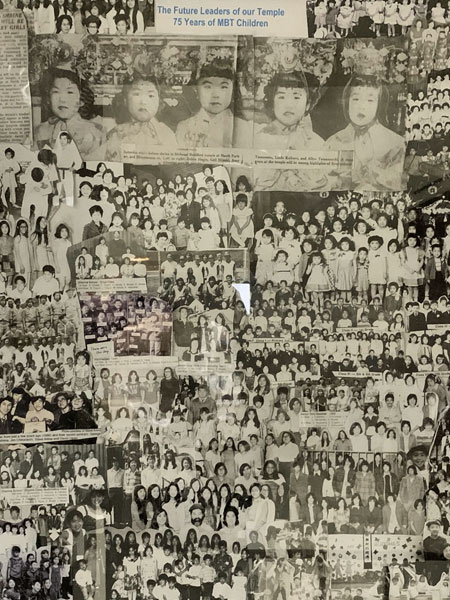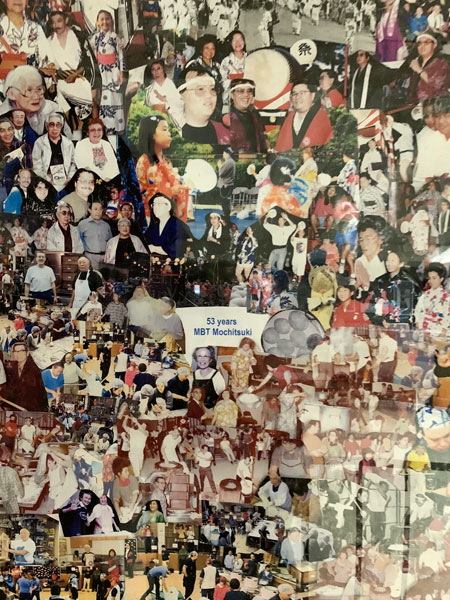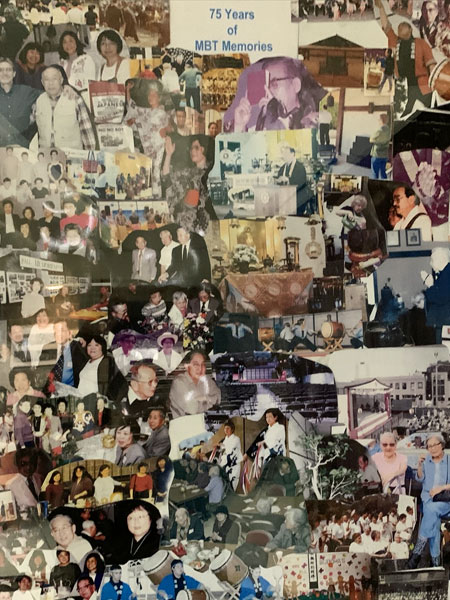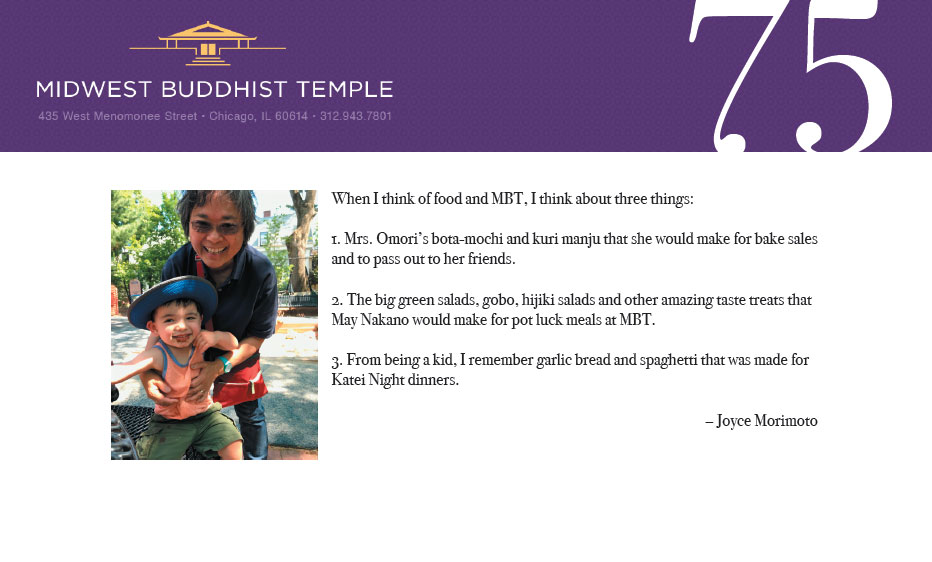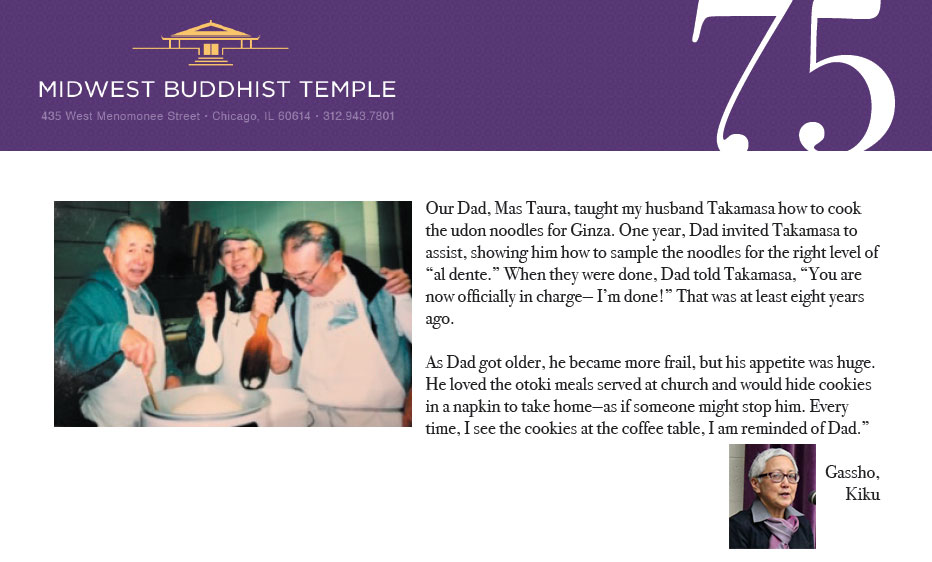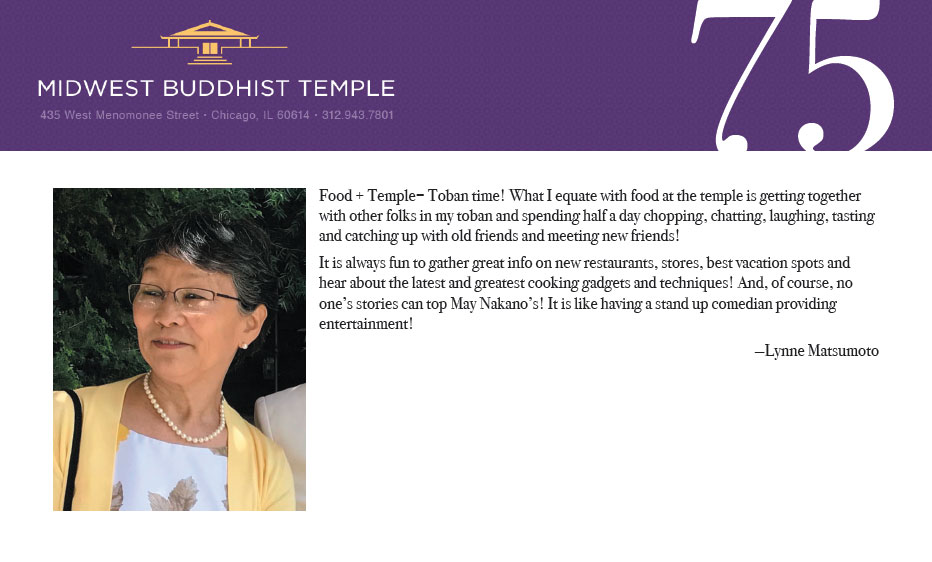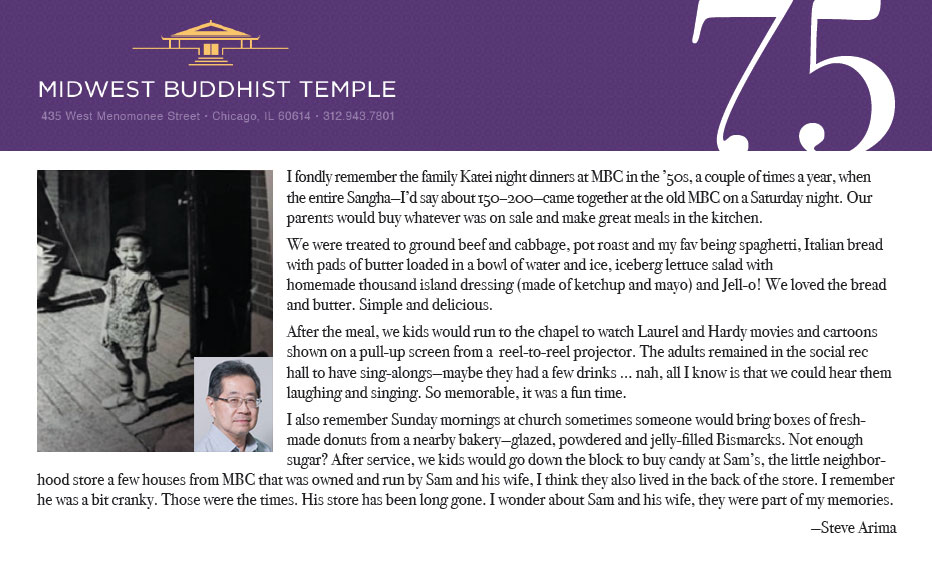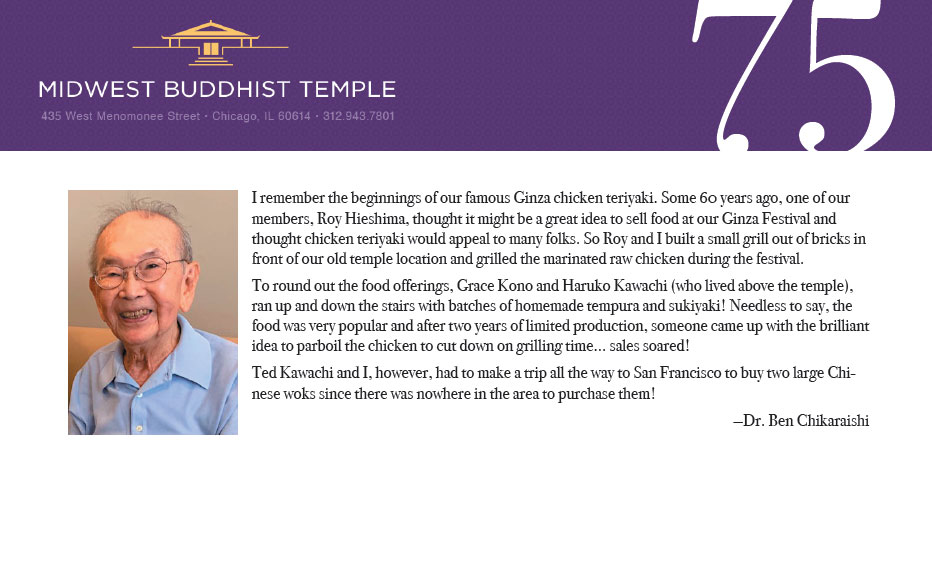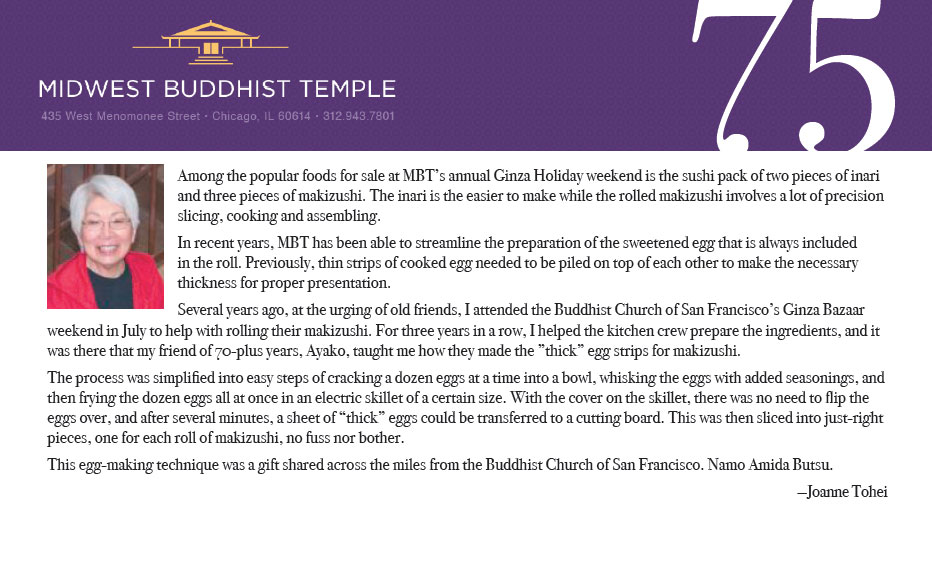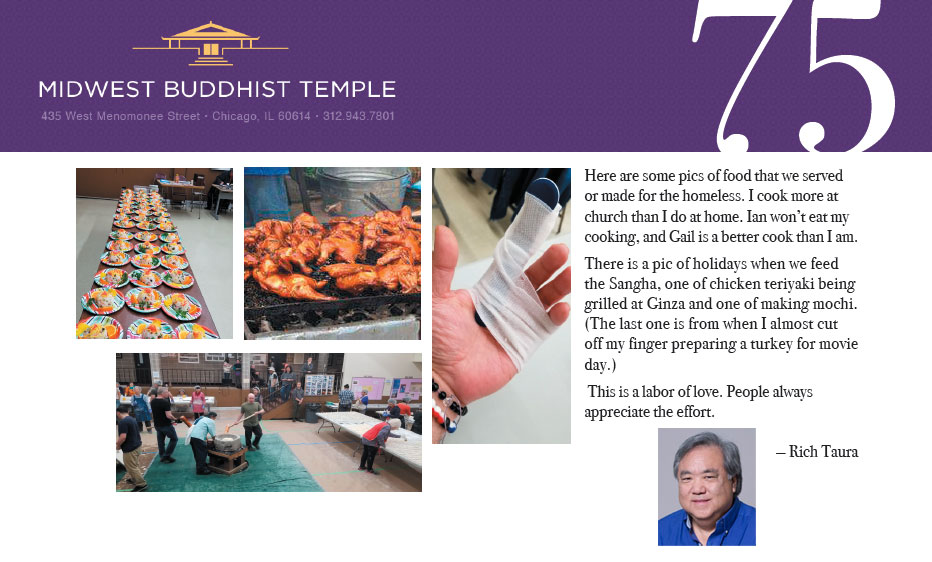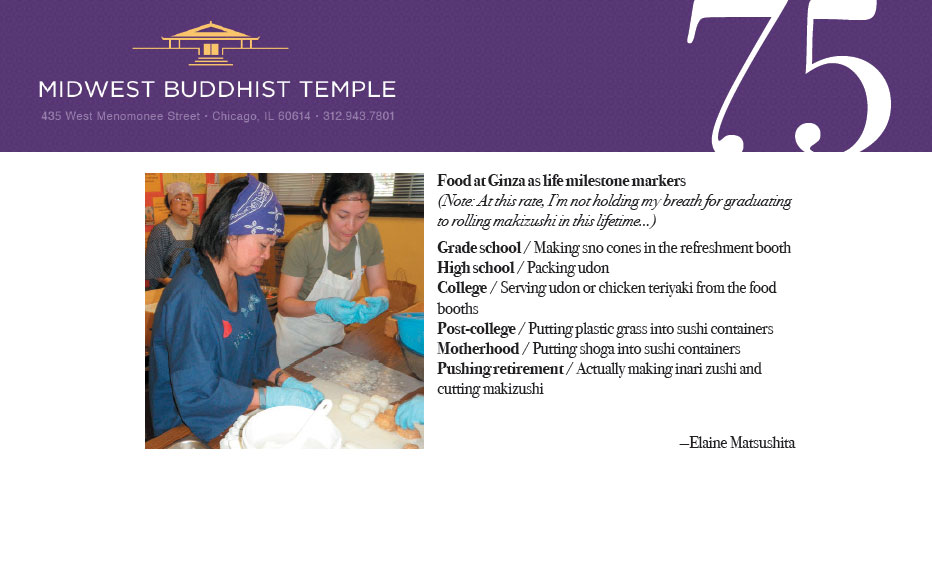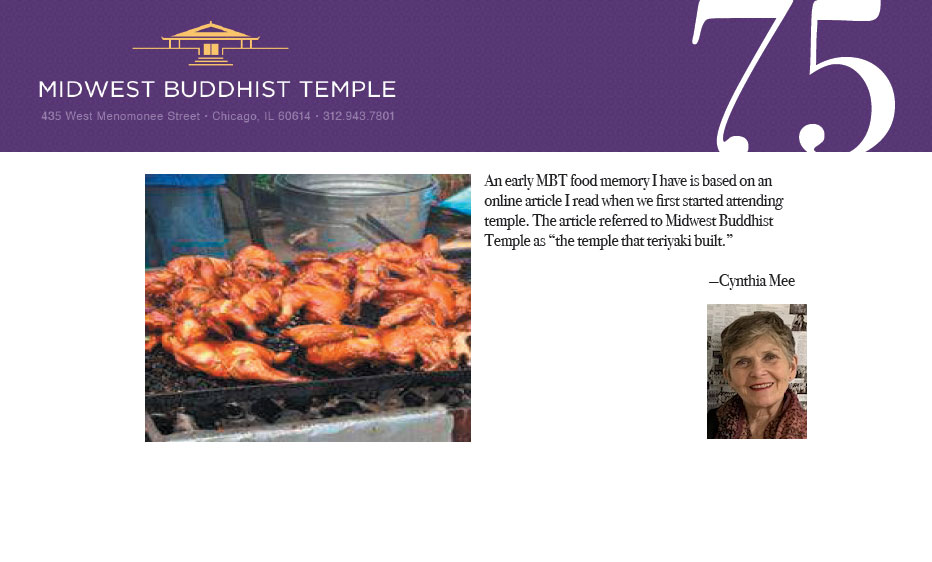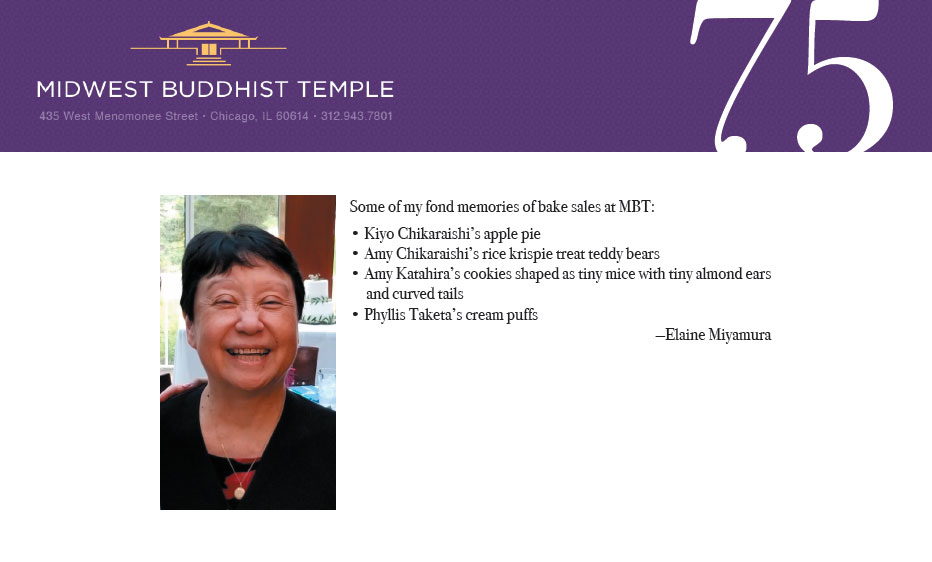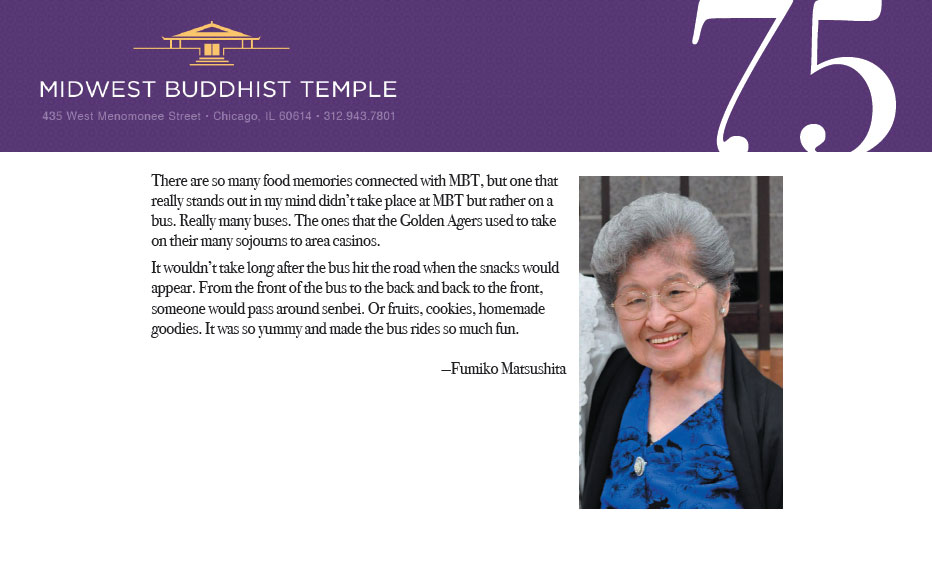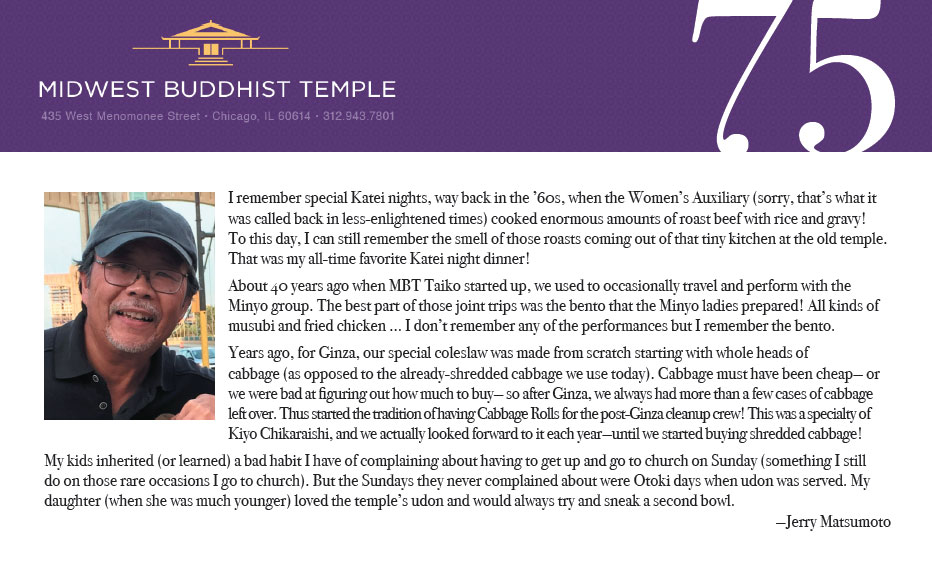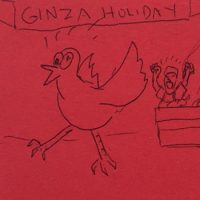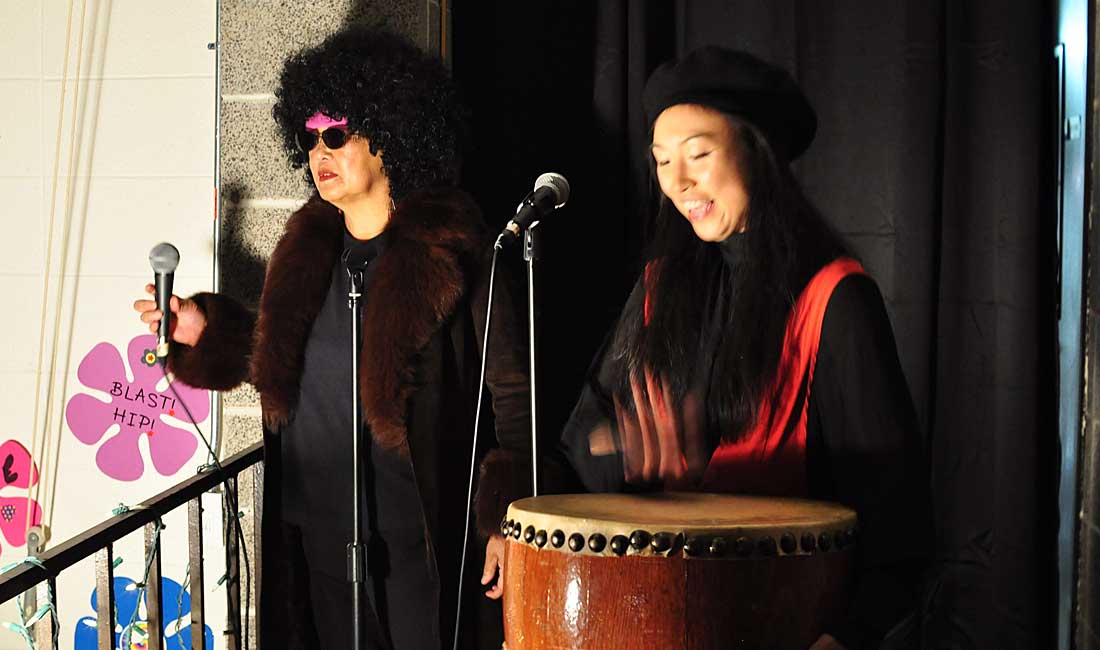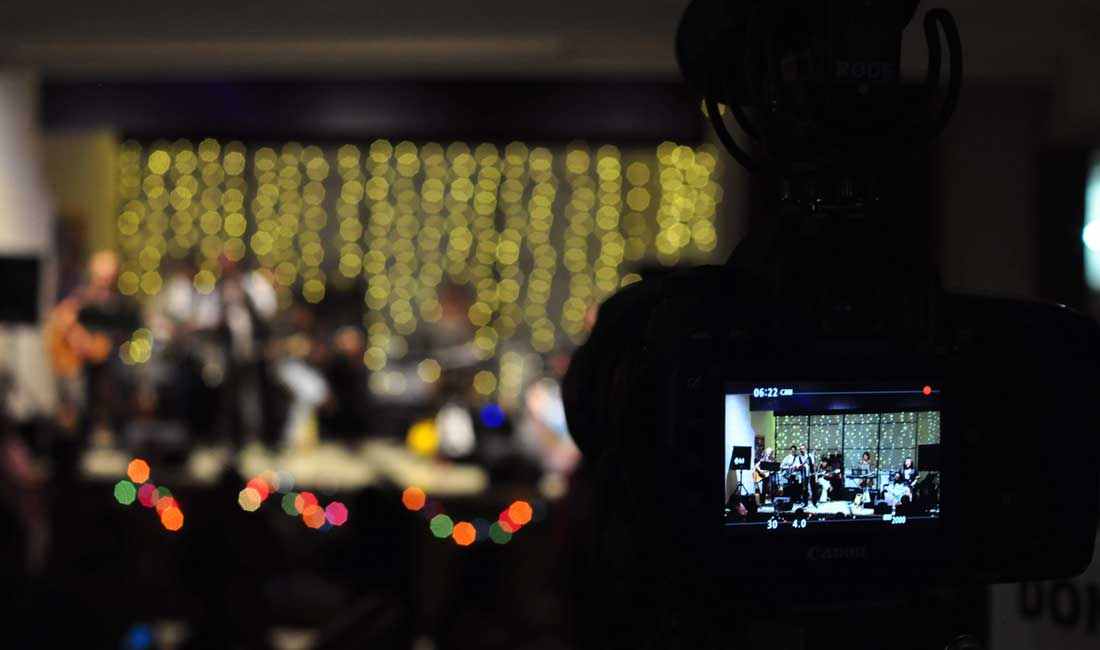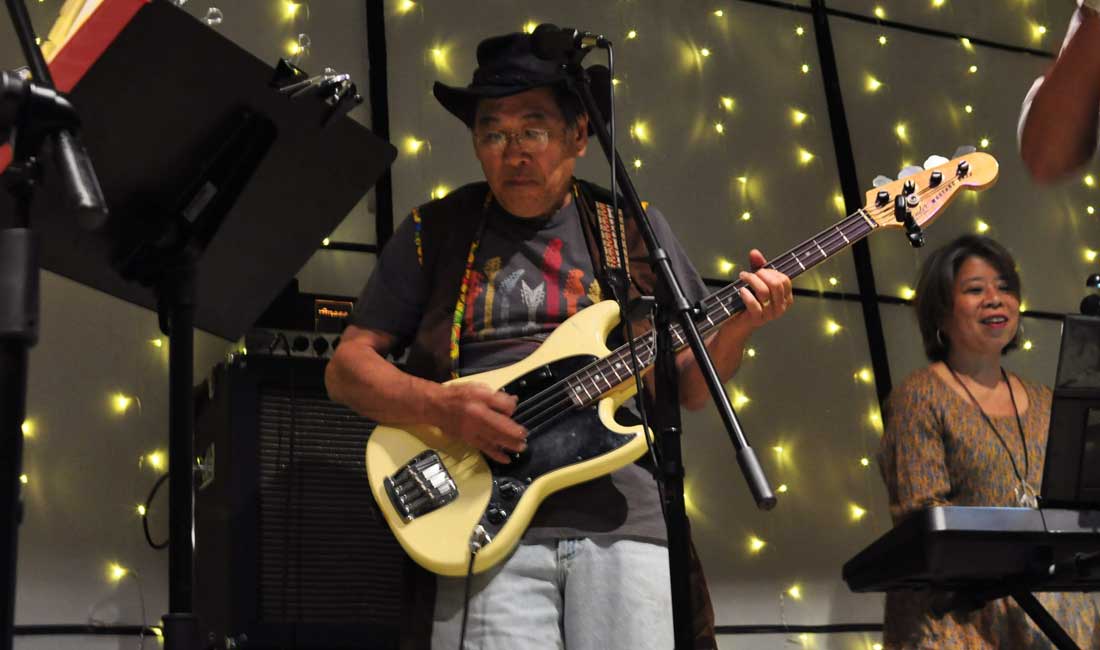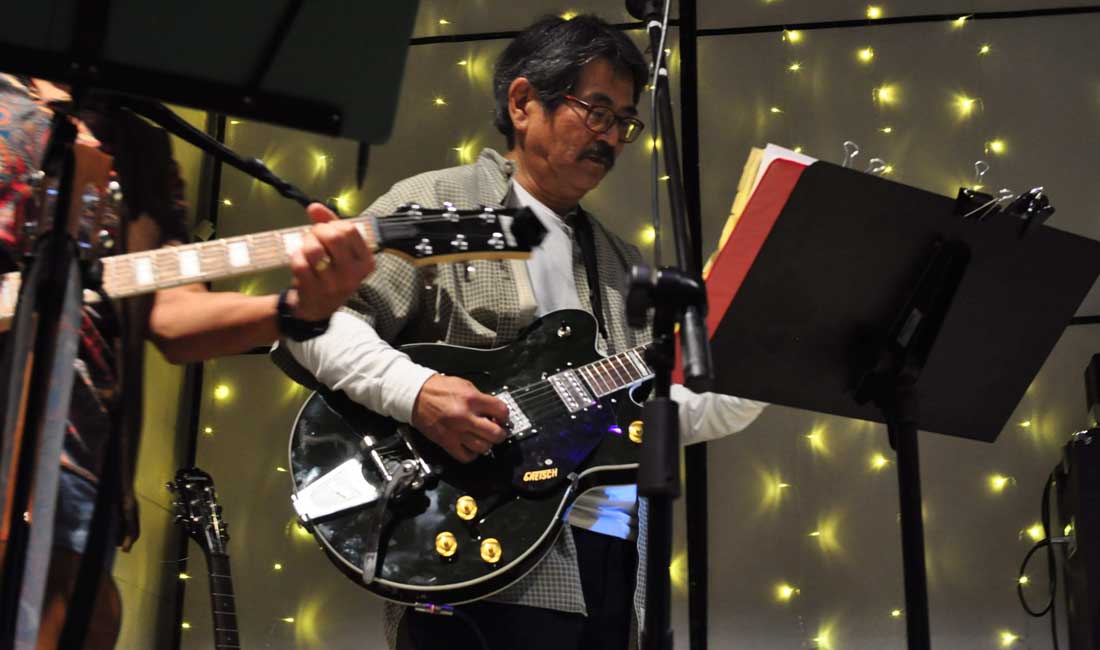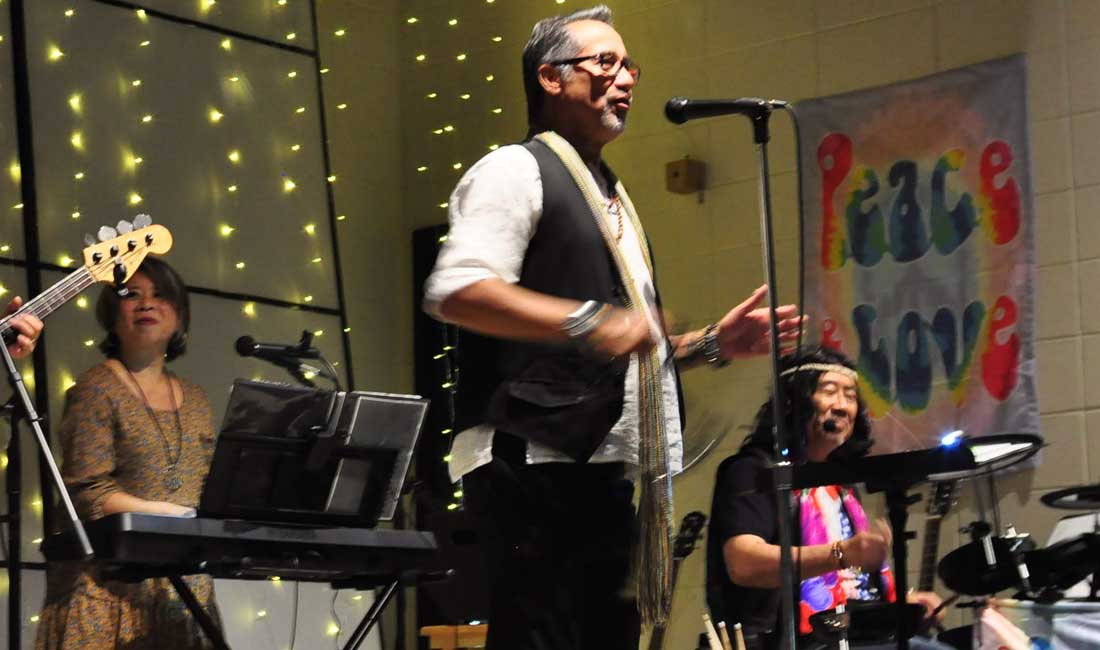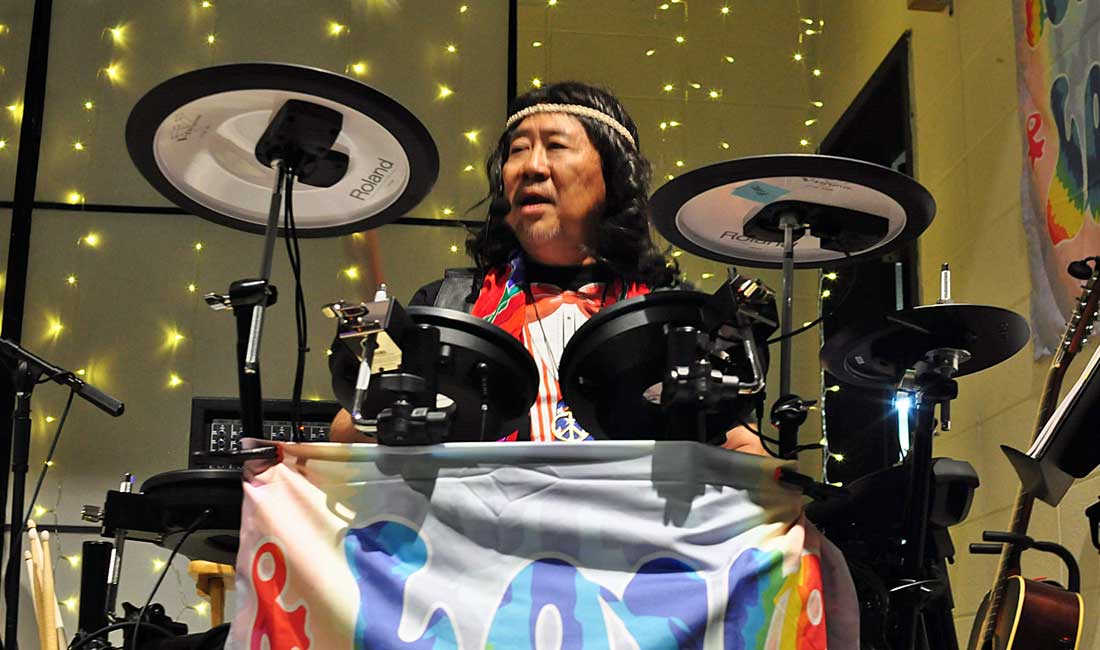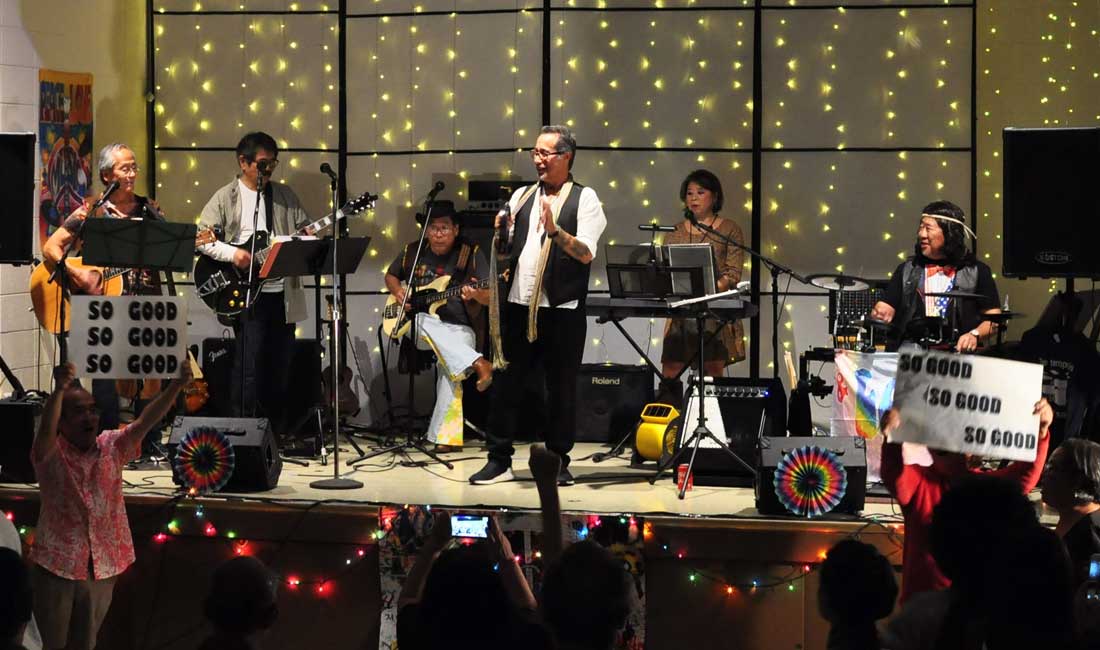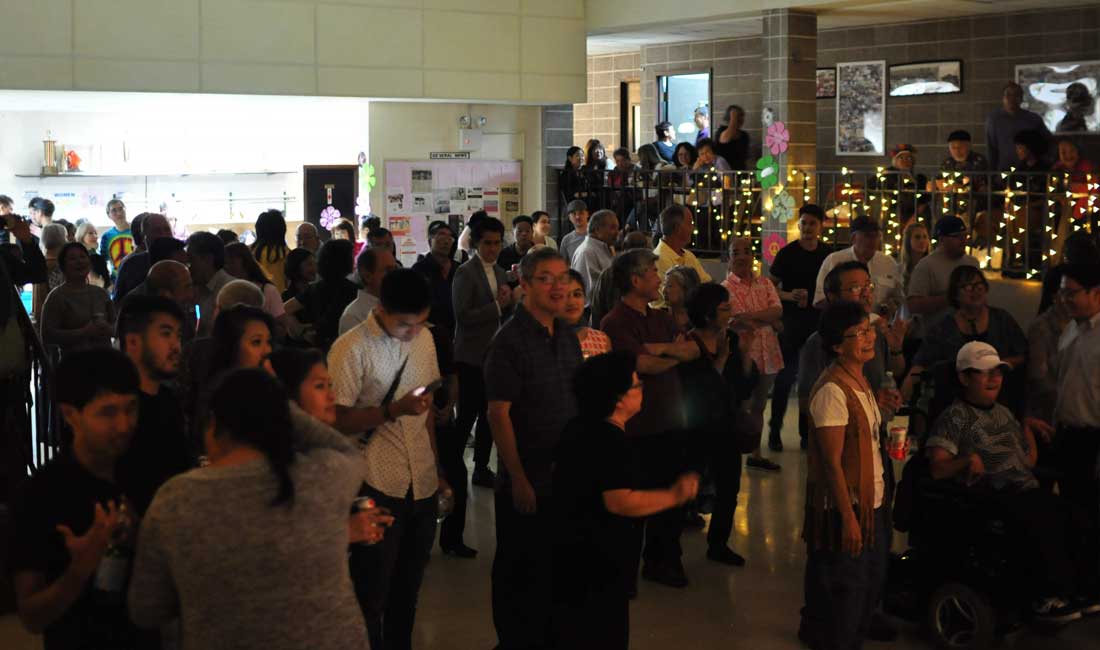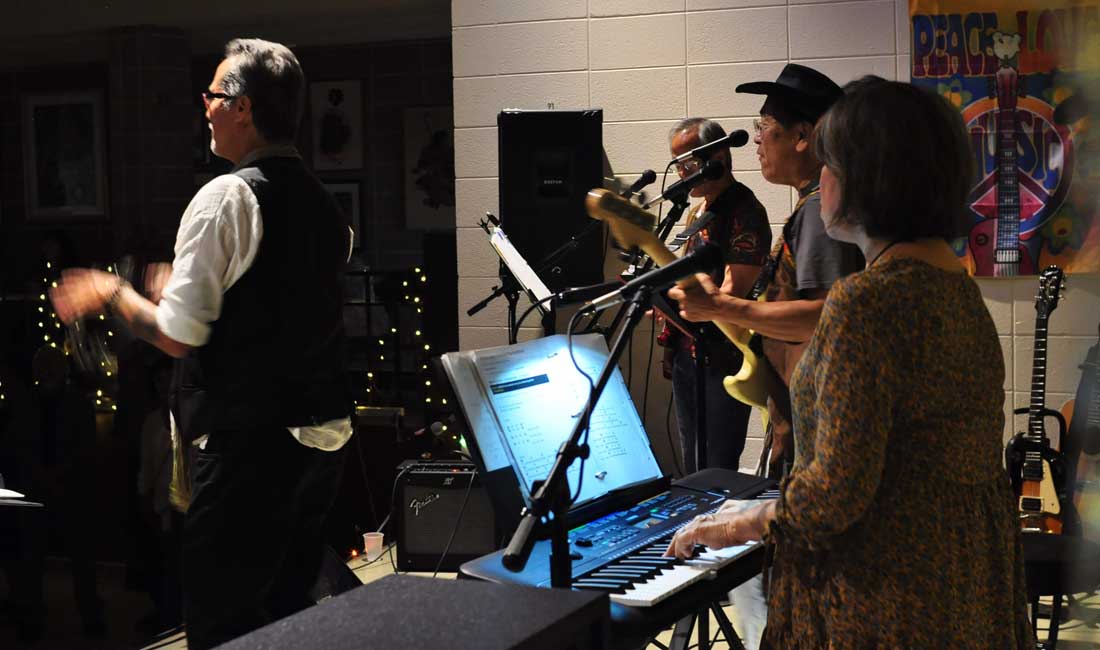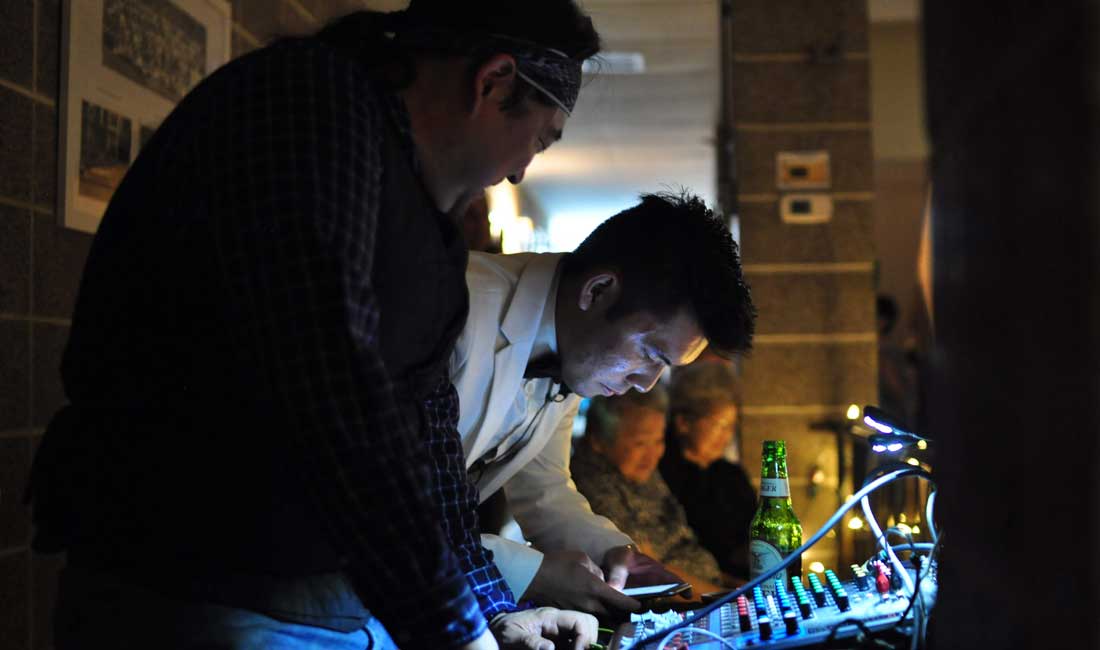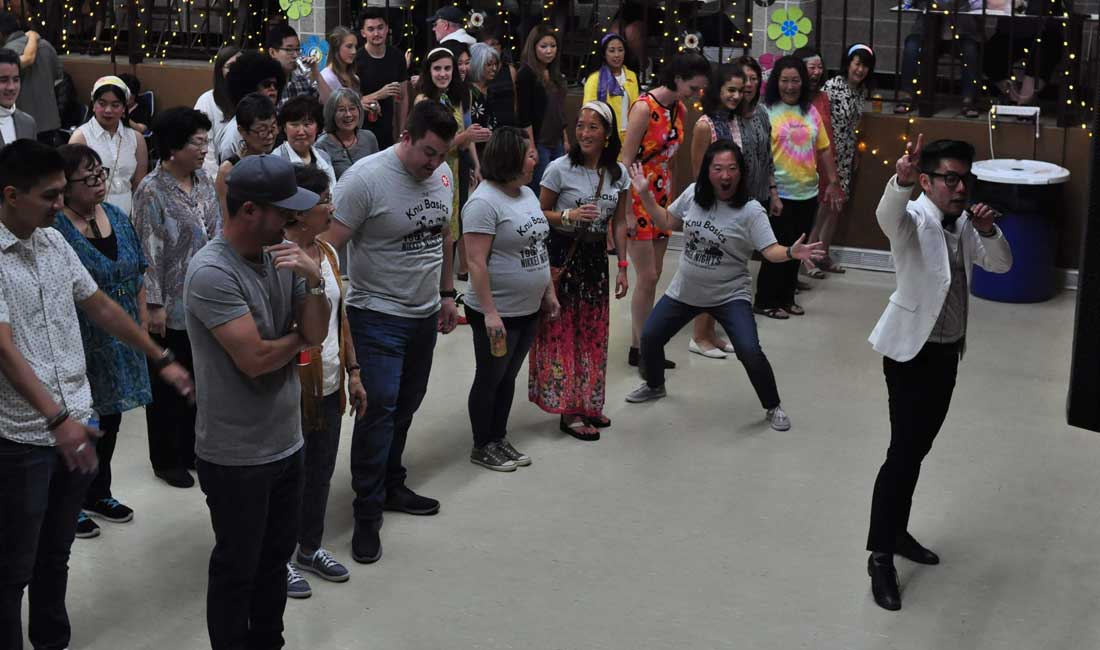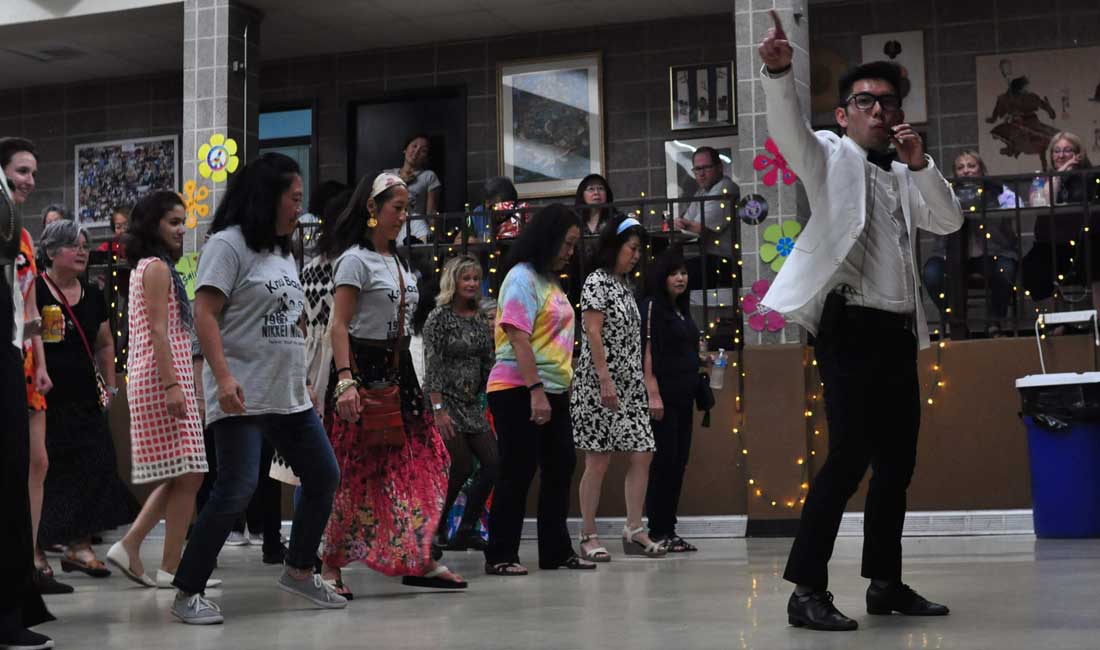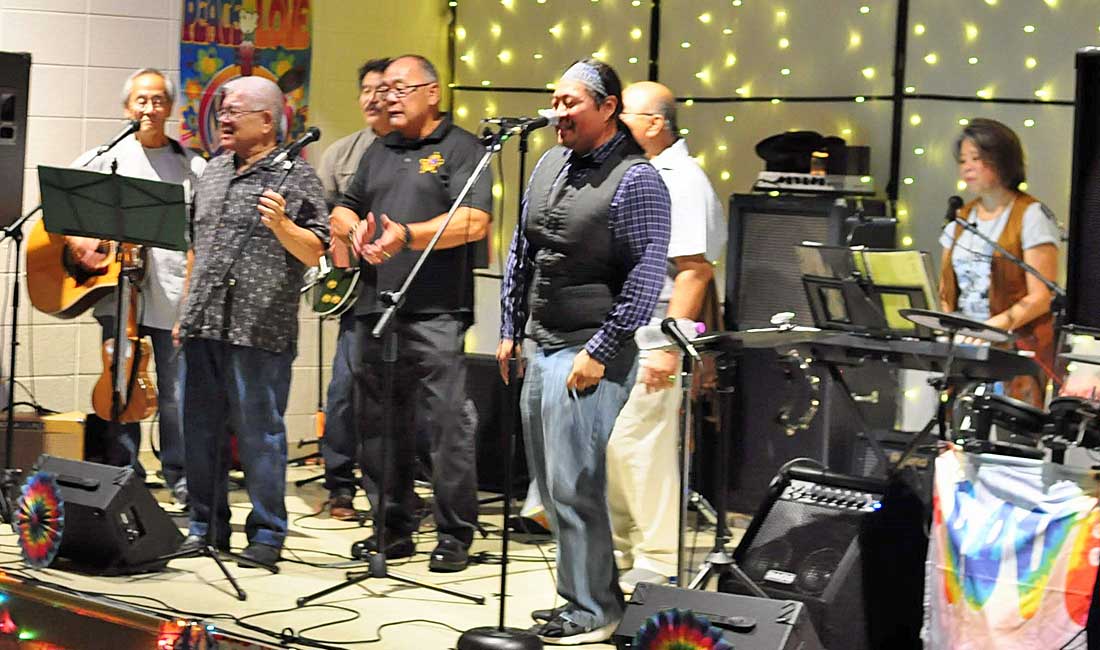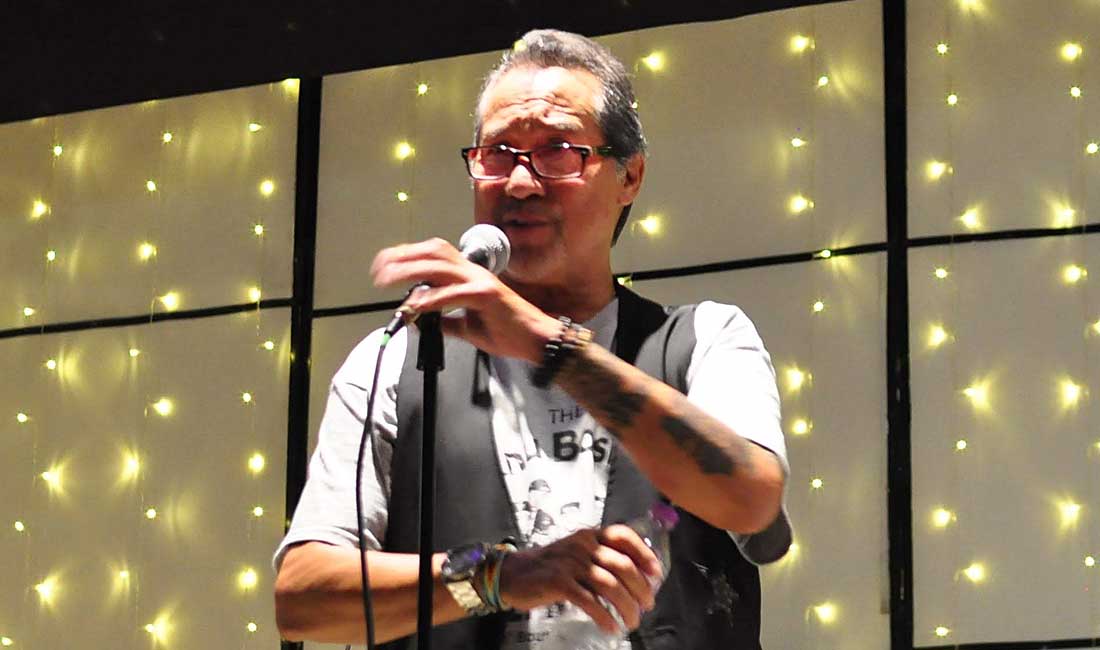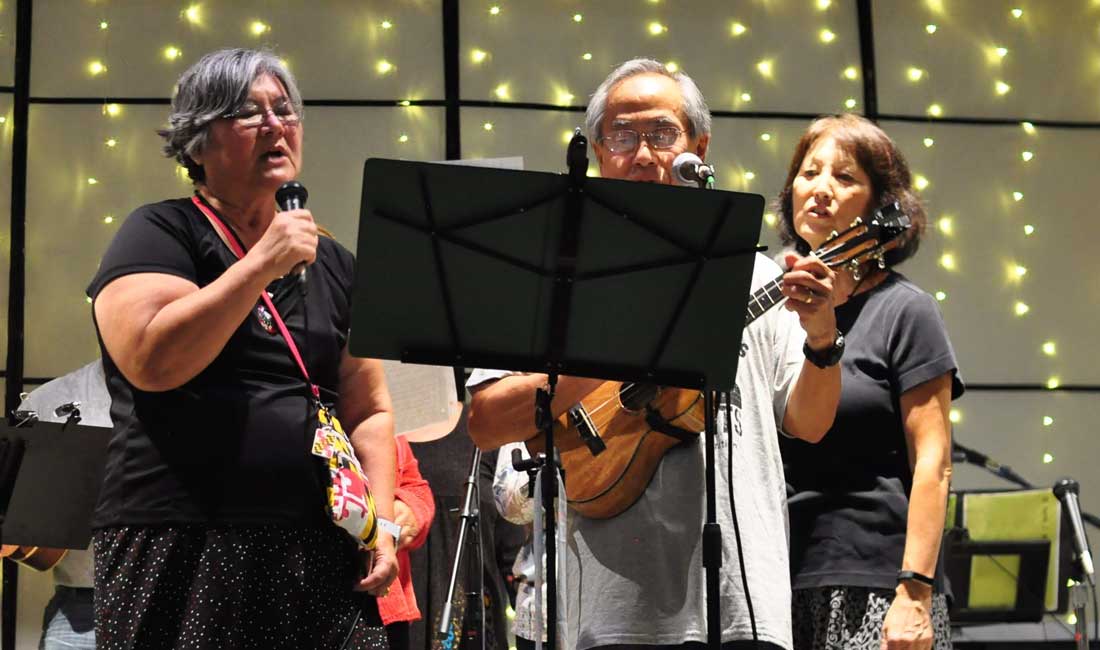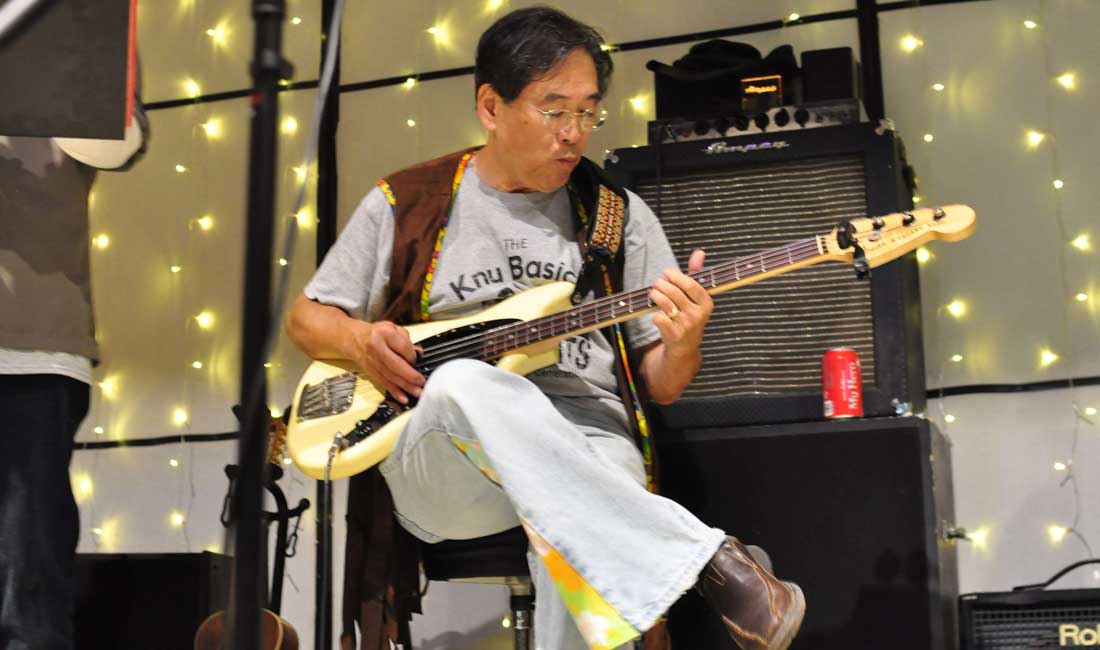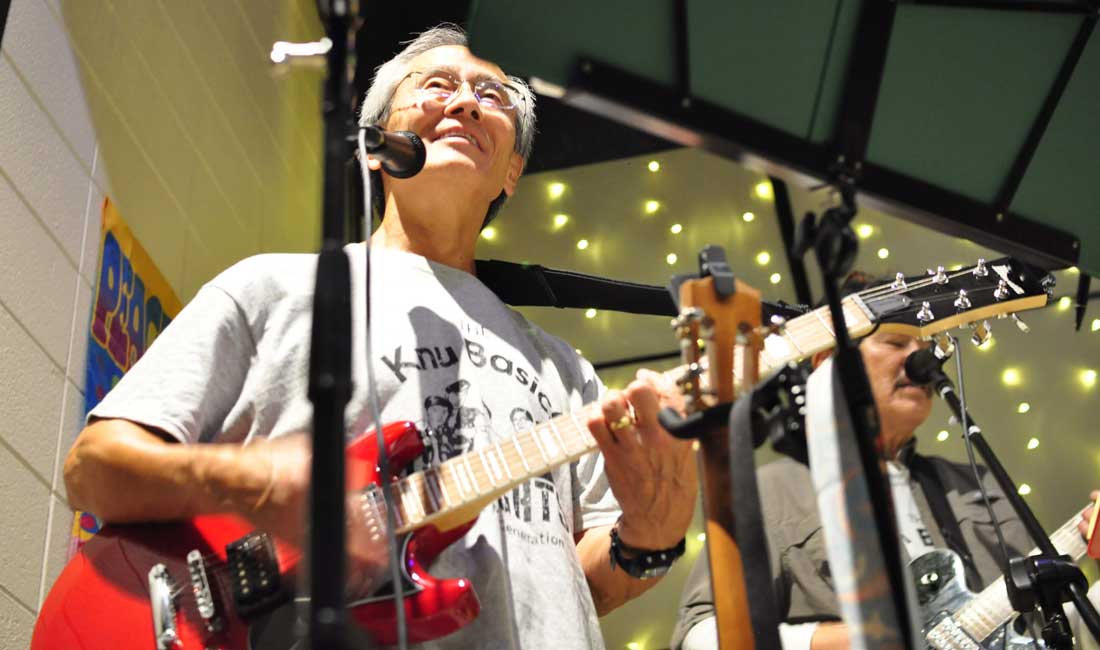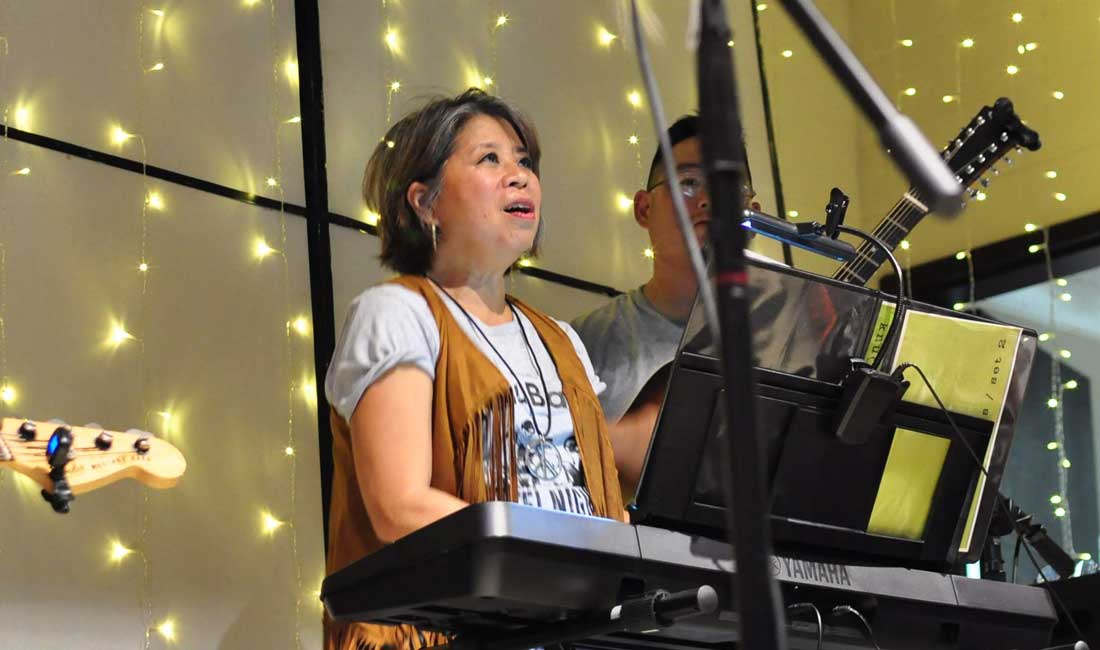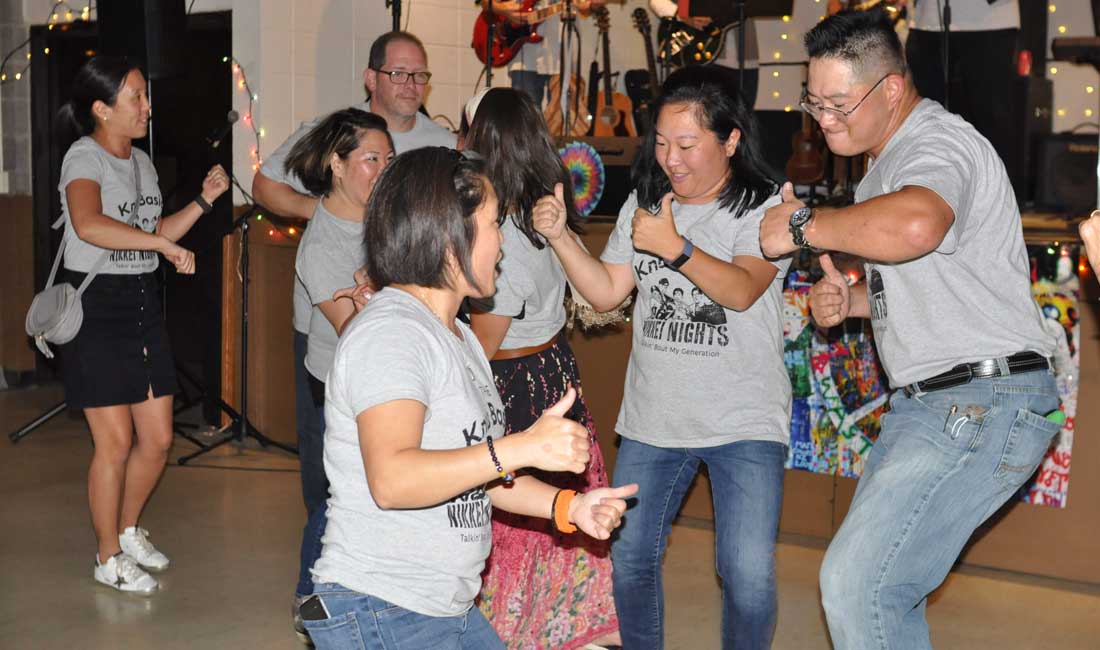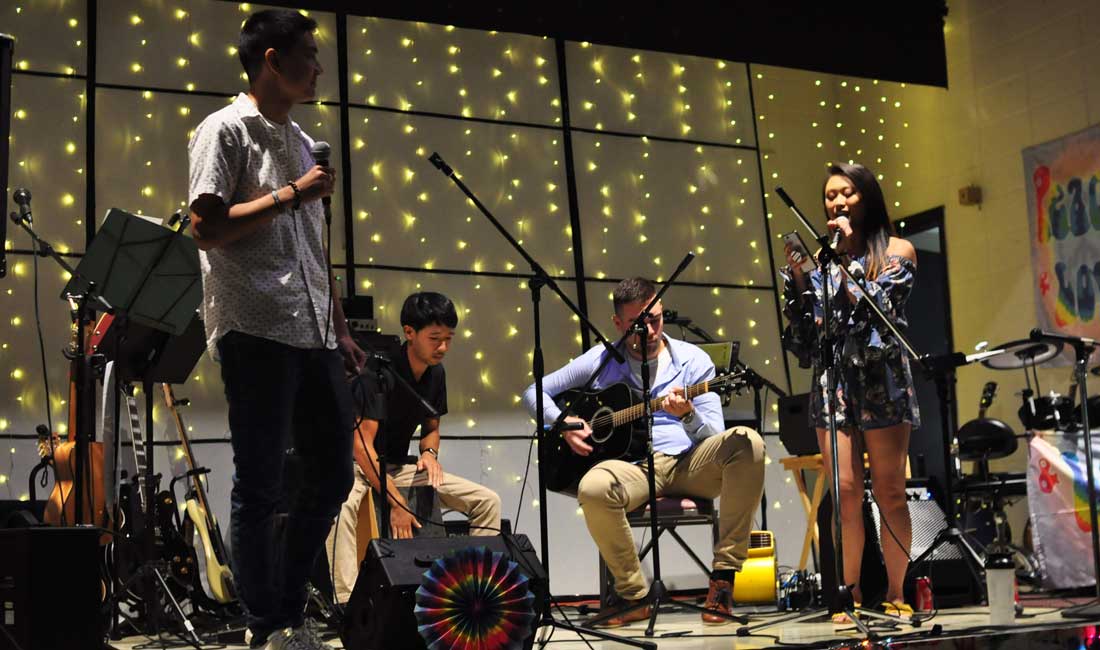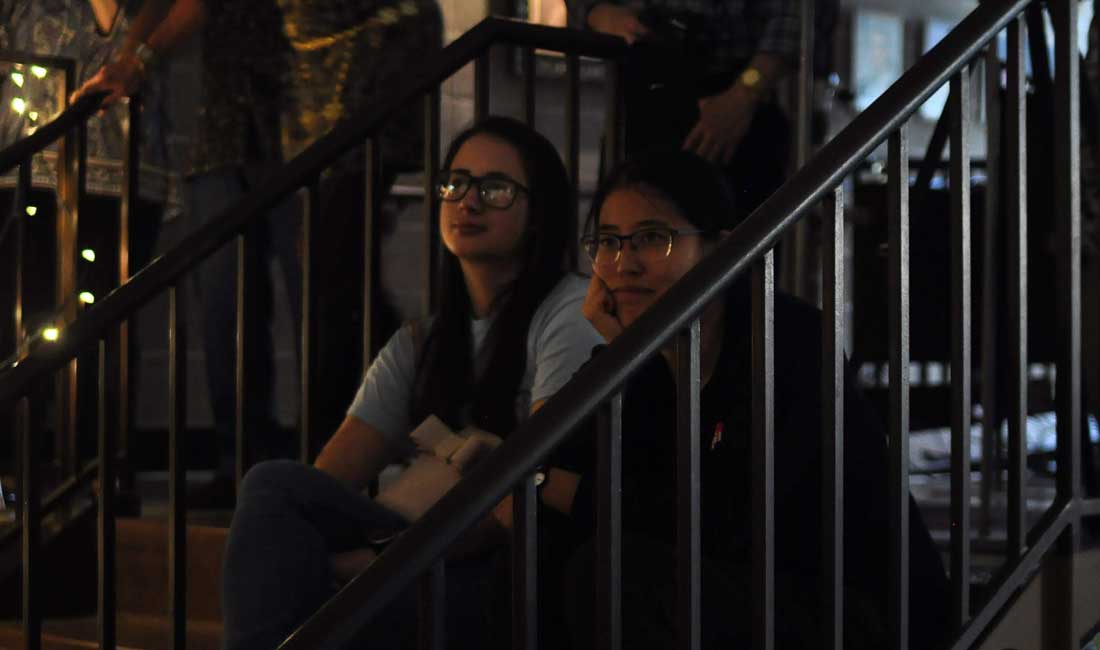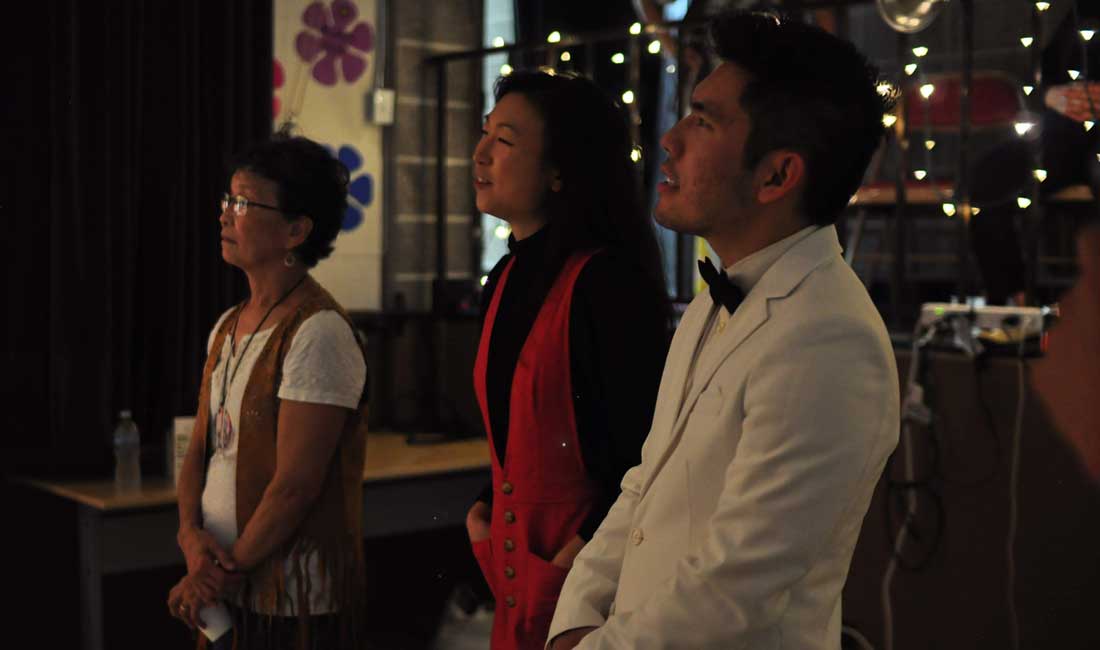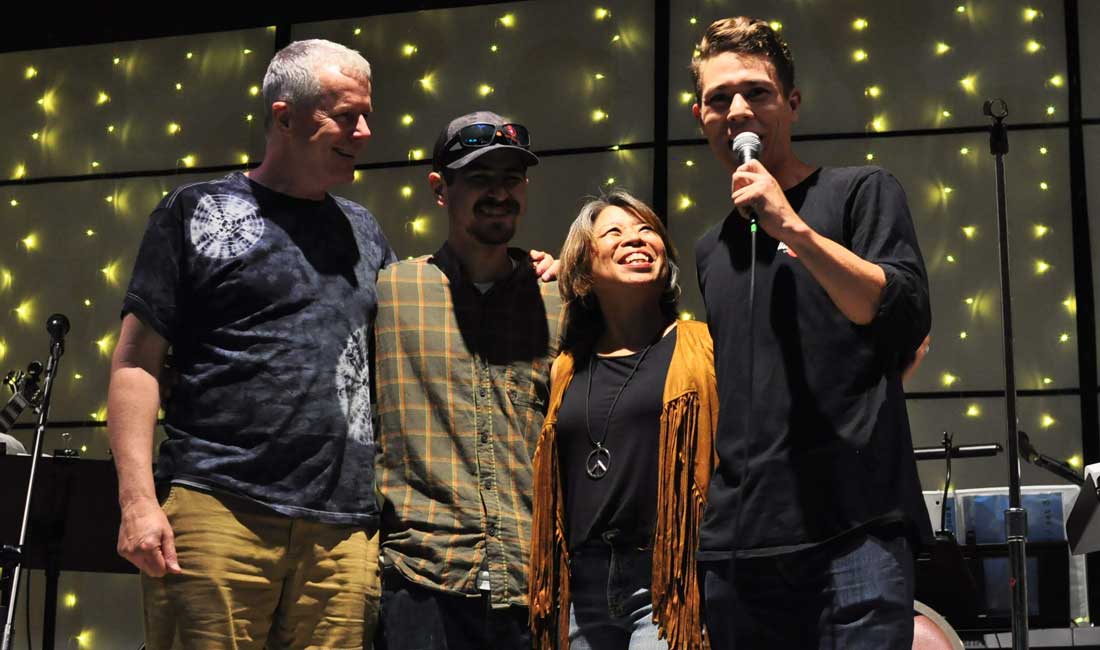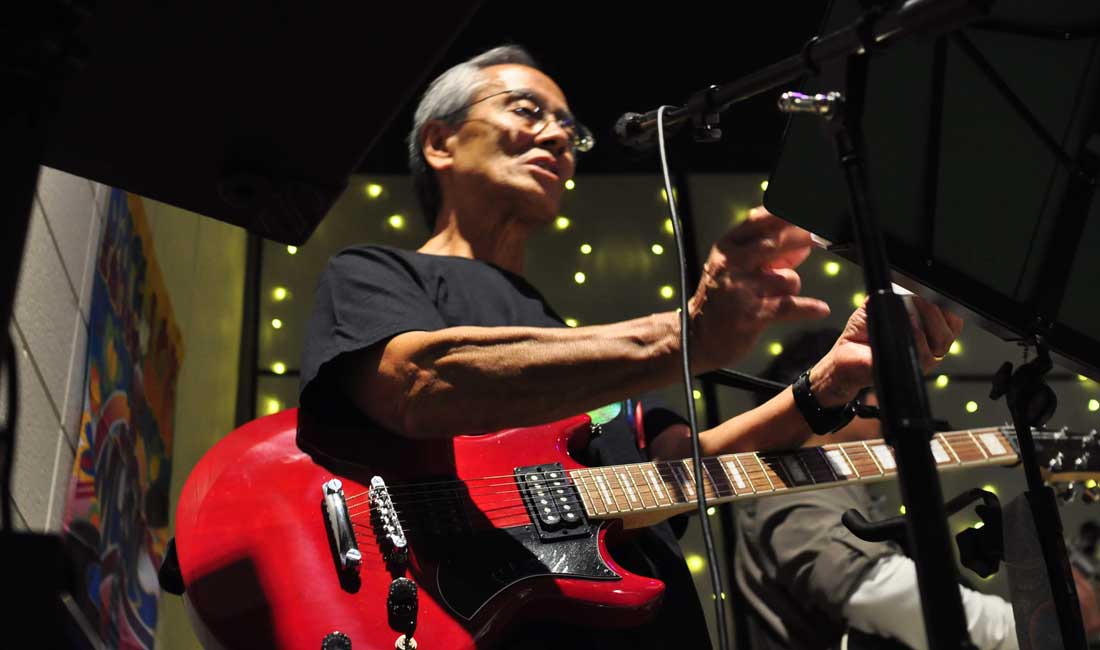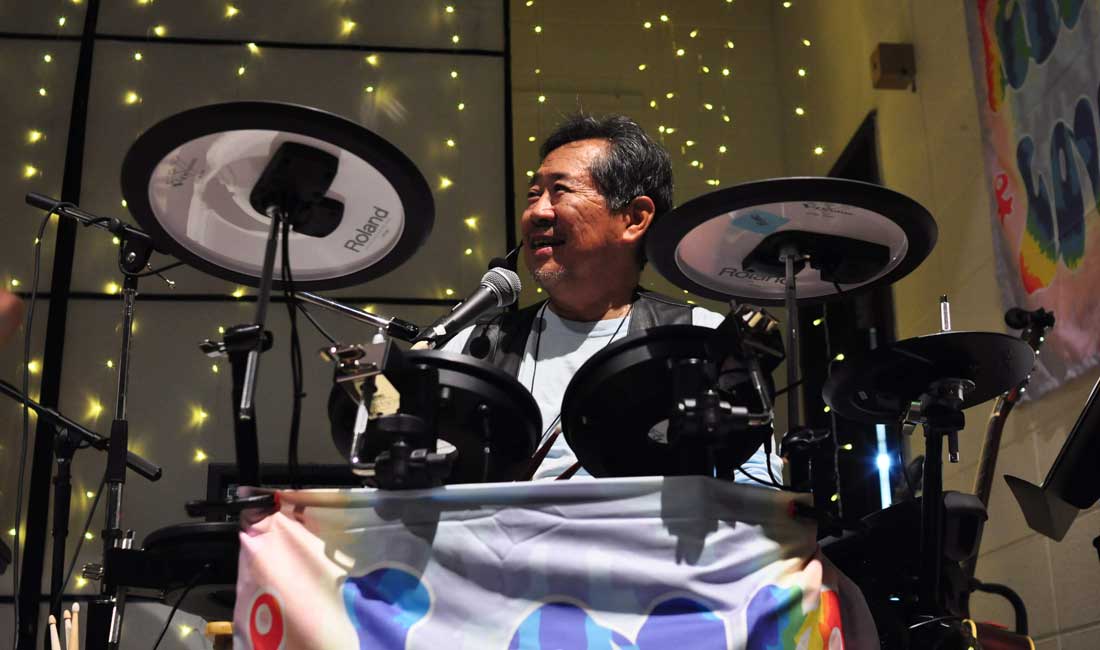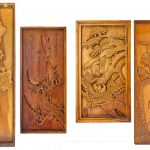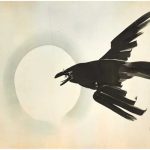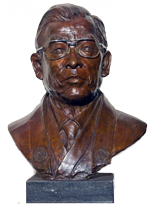
July 10, 1944. South Parkway Community Hall. Southside Chicago. Rev. Gyodo Kono holds the very first service of a small congregation of Jodo Shinshu Japanese American ‘resettlers’. Seventy-five years ago such were the humble beginnings of Midwest Buddhist Temple.
To commemorate our Sangha’s 75th milestone, we held multiple events throughout 2019 to; recognize the challenges facing our founding members, to relive memories of the generation who “came of age” at MBT, and to celebrate today’s dynamic Sangha.
We’ve assembled pictures, articles, memories and even recipes that were all part of our year-long celebration. Among the many things you can view are two very special surprises from our 75th Anniversary luncheon. First we enjoyed a beautiful video, created by Jason Matsumoto, that chronicled our anniversary year and even included rare footage of Rev. Kono as he spoke in our newly constructed chapel nearly 50 years ago. Then each family was presented with a tenugui (decorative Japanese towel) specially designed by Waza artisan, Masahiro Kawakami, to commemorate MBT’s 75th anniversary. We hope you enjoy this collection of memories.
Hints for exploring this page: You can skip to a section by clicking one of the links above or your can simply scroll down the page. Each of the photograph slideshows will automatically start and you can also position your mouse over any picture to pause the display and reveal the navigation controls.
Messages about our 75th Anniversary
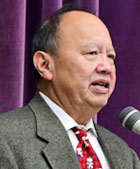 REV RON MIYAMURA – Resident Minister: As we celebrate our 75th Anniversary we should pause to look back with a sense of gratitude and forward with a sense of hope.
REV RON MIYAMURA – Resident Minister: As we celebrate our 75th Anniversary we should pause to look back with a sense of gratitude and forward with a sense of hope.
Our temple began with just six members in 1944. Rev. Gyodo Kono, just released from the Rohwer Relocation Center in Arkansas, came to Chicago with the ambition to start a Jodo Shinshu temple. We are grateful to Rev. Kono and the many Nisei who risked much to establish our temple during times of great distrust of any persons of Japanese descent.
Our temple not only survived but flourished in the following decades. Having started as an “ethnic” temple our Sangha has now become more diverse. New people are finding MBT through paths such as ZenShin Meditation services and even our Dharma School is attracting new families. This points to a positive future for MBT.
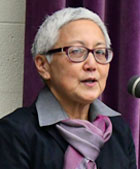 KIKU TAURA – MBT President: On Sunday, Nov. 3, Midwest Buddhist Temple capped a year of commemorative events with a luncheon in honor of our 75th anniversary. I was happy to see that an estimated 175 Sangha members and friends came to celebrate the occasion, and the full house reflected the many faces of MBT today.
KIKU TAURA – MBT President: On Sunday, Nov. 3, Midwest Buddhist Temple capped a year of commemorative events with a luncheon in honor of our 75th anniversary. I was happy to see that an estimated 175 Sangha members and friends came to celebrate the occasion, and the full house reflected the many faces of MBT today.
Nisei attendees (part of MBT’s founding generation) were seated as guests of honor at the front tables, and we were fortunate to see those who could attend, while missing those who were unable to do so. Legacy generations (third-generation Sansei and fourth-generation Yonsei) were well-represented, as well as our members and friends from Zen Shin Meditation. Dharma School families were there in full force, adding their usual energy to an already energized atmosphere.
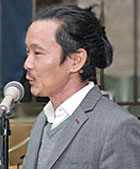 JASON MATSUMOTO – 75th Anniversary Committee Chair: MBT, throughout its 75 years, is fortunate to have been under the guidance of forward-thinking leadership. MBT values openness and inclusivity, inviting people who are 1 mile away or 10,000 miles away to, as Rev. Ron likes to say, “come as you are.”
JASON MATSUMOTO – 75th Anniversary Committee Chair: MBT, throughout its 75 years, is fortunate to have been under the guidance of forward-thinking leadership. MBT values openness and inclusivity, inviting people who are 1 mile away or 10,000 miles away to, as Rev. Ron likes to say, “come as you are.”
Traditionally, anniversaries at the temple have been celebrated in a single, blowout event. For this year’s 75th, we tried to do things a little differently. Instead of one huge gala, we held a series of events over the course of the year designed to honor, reminisce, and celebrate.
For me this has been a wonderful year of learning (and sharing) more of our history and celebrating our Sangha.
75th Anniversary Luncheon
November 3, 2019
Photography: George Nagata, Jason Matsumoto,
Alvin Hayashi, Alexa Tang, Joy Zavala
Historical Footage of Rev. Kono courtesy of JASC Issei Gerontology Project (1975)
Music: “A Song For You” and “Summer of ’42” by Kishi Bashi (courtesy of Kaoru Ishibashi)
Video Editing: Katherine Nagasawa, Jason Matsumoto
HIGHLIGHTS FROM THE LUNCHEON
click any title to expand the section
Nikkei Nights; “Talking ‘Bout My Generations“
September 21, 2019
…a dark MBT dance hall with glimpses of psychedelic flowers and peace signs among strands of twinkle lights and the voice of Smokey Robinson filling the hall. Suddenly, lights hit Tonko Doi sporting a familiar afro saying: ”It is 1968 at MBC [Midwest Buddhist Church]…” However this time around, the dance-goers in the crowd are no longer just Sansei, but joined by multiple generations and races.
The sold-out evening, titled “Nikkei Nights; Talkin’ ‘Bout My Generations,” featured the reunion of the Knu(er) Basic, formally known as Knu Basic, which was made up by our own Steve Arima (on drums), Jim Chikaraishi (bass) and Elaine Matsushita (keyboard), as well as original band member George Formoso (lead vocals) and Darrell Kaneshiro (rhythm guitar) and Alan Arima (lead guitar). The band played three sets throughout the evening. They worked hard for the event, practicing eight hours per weekend leading up to the big night, with George driving nearly four hours each way from Michigan to get there.
He was not the only one traveling for the event. The performance also brought the whole Chikaraishi gang together, as well as two fans —friends and Chicago natives Naomi (Shimomura) Kawahara and Barbara (Kurokawa) Yamadera—from California and other groupies across the Chicagoland region.
The band played classic ’60s songs, including Steve’s trademark “Last Kiss,” and the never-ending “Shout.” One memorable moment was when the band invited special “voice of the angels” guests on stage—including Ryan Toguri on lead with David Toguri, Mike Naito and Al Shimizu singing backup on “My Girl.” David later remarked that they didn’t get to rehearse it, but when Ryan jumped on vocals, he wasn’t going to argue.
Also in the crowd was Fumiko Matsushita and Yayeko Adachi, as Elaine Matsushita and her then-fiance Bob Sutter were recognized by the band and her sons Josh and Sam Fidler for their wedding that would follow the next day.
Yonsei also led the evening with entertainment throughout intermissions. Brandon Ishikata, a JACL Kakehashi Program alumnus, led line dancing that got the whole floor moving to Earth, Wind & Fire’s song “September” to fit the occasion (the song appropriately begins “Do you remember, the 21st night of September?” and the event was held on Sept. 21). Brandon professionally teaches dance at “May I Have This Dance” studio (mayihavethisdance.com) in Jefferson Park.
Also performing during one of the night’s breaks was the ensemble “Friends of 94,” featuring JACL board member Lane Mita, as well as Mas Hoshii, Joey Rolla and Elizabeth Mangulabnan. All had performed separately during the Open Mic Night last June during the MBT’s 75th Anniversary event “Contested Histories.” Despite not living during the times, they brought the crowd back to the ’60s grooves of Stevie Wonder and “Sukiyaki.”
Outside of the performances, crowds of different generations came together and shared memories of the Knu Basic performances back in the ’60s and ’70s at Viking Hall and Battle of the Bands in Chinatown, as well as some of the other bands that used to also gig around town back then.
While the conversations happened in the Social Hall, Anna Takada, Kat Nakagawa and Jason Matsumoto were busy gathering interviews to capture not just the stories, but also the memories being made that evening. Some of these footages will be going toward JASC’s archives.
As a personal shout out, thank you to the Dance Committee’s co-chair Elaine Ogawa and committee members Steve Arima, Jason Matsumoto, Lisa Doi, Gary and Lynn Yamagiwa, Tonko Doi, Rich Taura and Gail Chase; and to all of the volunteers from MBT and JACL-Chicago. Together, we raised over $4,000 that will be divided between the MBT 75th Anniversary fund and JACL Chicago youth groups. Outta sight.
by EMILY HARADA (reprinted from MBT Bulletin Oct 2019)
FINDING HOME
May 17-19, 2019

As part of our 75th anniversary MBT was honored with a special visit from Los Angeles’ Japanese American National Museum (“JANM”). Key museum staff were in Chicago Friday May 17th to Sunday May 19th to present CONTESTED HISTORIES, the museum’s traveling exhibit that displays never-before-seen art-and-craft objects created by Japanese Americans incarcerated during WWII.
With this special opportunity to host CONTESTED HISTORIES in Chicago, JANM staff and Chicago community leadership collaborated to offer a series of programs to reflect, discuss, learn and process this part of our history. These programs, collectively entitled FINDING HOME (Re)Building a community in the Second City, took place during the exhibit of CONTESTED HISTORIES and here we provide a summary of three events:
CONTEST HISTORIES exhibit and discussions
Sharing Stories: Intergenerational Conversations
Stage reading of “Garage Door Opener”
CONTESTED
HISTORIES
Contested Histories: Art and Artifacts from the Allen Hendershott Eaton Collection came to the Midwest Buddhist Temple on May 18 and 19 as part of the temple’s 75th anniversary celebrations.
The traveling exhibit features art-and-craft objects and other handmade items created by individuals of Japanese descent who were wrongfully
incarcerated in American concentration camps during World War II. These items were collected by Mr. Eaton while he was researching his book “Beauty Behind Barbed Wire: The Arts of the Japanese in Our War Relocation Camps” (1952).
After being kept in storage for many years, the collection was saved from being dispersed by auction in 2015 by Japanese American community leaders and activists. Ultimately, the collection was transferred to JANM. For more information, visit janm.org/exhibits/contested-histories/
This is the first time this exhibit will be shown in the Midwest.
by Joyce Morimoto (from MBT Bulletin April 2019)

INTERGENERATIONAL
CONVERSATIONS
As its name suggests “Sharing Stories: Intergenerational Conversations” brought together old and young in meaningful conversations about experiences, memories and the impact that the incarceration of Japanese Americans had upon those who lived through it and the generations that followed. Some excerpts from the conversations:
…One thing that I hadn’t thought about much but that came up often from the people who were young children in the incarceration camps was the struggle to find housing after coming to Chicago. It’s not an issue that I think of as specifically affecting Japanese Americans in Chicago today, but it was a common struggle for our community not long ago.
…Many Sansei and Yonsei who came to the event explained that they were seeking their family history that they were unable to hear from their parents and grandparents.
…Across generations, shame and silence was a common theme shared by the Issei and older Nisei participants, as it was a difficult and ostracizing time. Still, one Nisei remarked, “Regardless, I’m proud to be Japanese American.”
…A common conclusion among the participants was their heightened awareness of the generational impact of the incarceration—with trauma that experienced by incarcerees being passed down to their children.
…Maybe we are stepping in the right direction, though, as the younger generations are finding the voice that those who lived through EO 9066 could not find, and giving those who lived through it an opportunity to tell their story.
GARAGE DOOR OPENER
stage reading
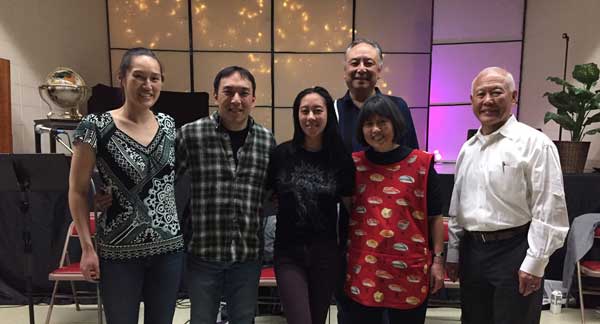
(pictured above: the cast – Diana Lee, Dwight Sora, Aurora Adachi-Winter, Anne Shimojima and Ron Wesley—with ‘Garage Door Opener’ playwright Soji Kashiwagi)
The stage reading of Soji Kashiwagi’s “Garage Door Opener,” performed at MBT as part of the temple’s “Contested Histories: Finding Home” weekend, effectively employed humor to delve deeply into the pain and dysfunction between the Nisei and their children. The performance was given by five local actors—Dwight Sora, Anne Shimojima, Aurora Adachi-Winter, Roy Wesley and Diana Lee.
The garage filled with kamaboko boards, broccoli rubber bands and tofu containers came to represent all the emotions, conflicts and resentment that some Sansei carry with them. Through the discovery of other memorabilia by Glen and Sharon, the adult children gain a wider perspective and a deeper understanding of the trauma their Nisei parents experienced through their incarceration.
The discovery of their father’s valedictorian speech on citizenship, which sang praises of this great country, stood in stark contrast to the rounding up of Japanese Americans and being thrown into forced confinement in horse stalls and barracks. (read full article by clicking button)
‘AMERICAN SUTRA’ book launch
March 1, 2019
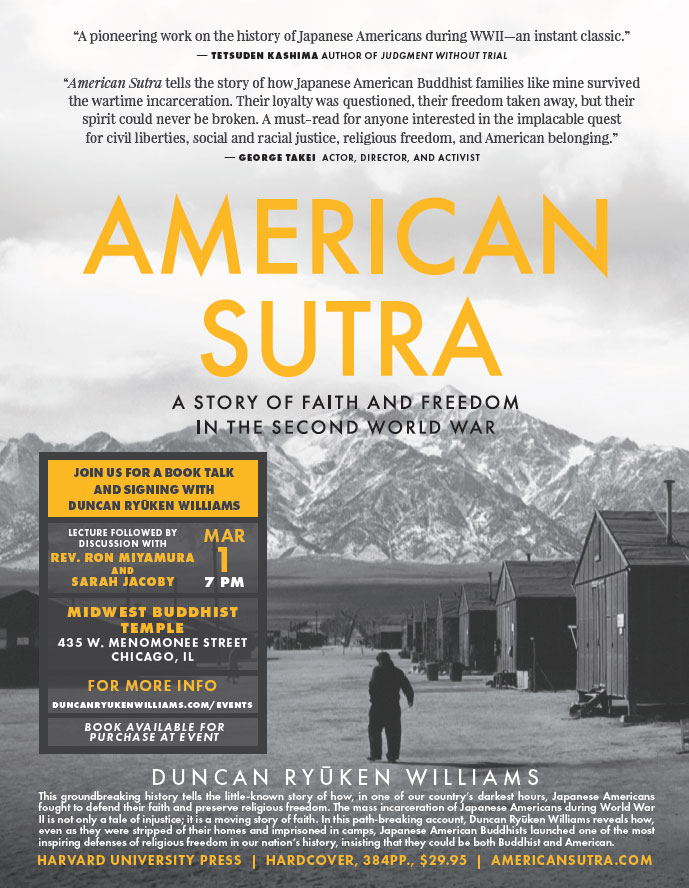
AMERICAN SUTRA – presentation
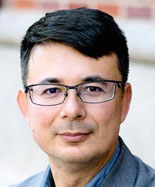 FRIDAY MARCH 1 USC professor Duncan Ryukan Williams, who is also a Soto Zen priest and author of the book “American Sutra: A Story of Faith and Freedom in the Second World War” gave a presentation and talk about “American Sutra.” The book, released by the Harvard Press on Feb. 19, reflects on how Japanese American Buddhists dealt with dislocation, loss and uncertainty during their wartime incarceration.
FRIDAY MARCH 1 USC professor Duncan Ryukan Williams, who is also a Soto Zen priest and author of the book “American Sutra: A Story of Faith and Freedom in the Second World War” gave a presentation and talk about “American Sutra.” The book, released by the Harvard Press on Feb. 19, reflects on how Japanese American Buddhists dealt with dislocation, loss and uncertainty during their wartime incarceration.
Drawing on contemplative practices and rituals from their Buddhist tradition, their stories represent timeless approaches to finding inner liberation when freedom has been taken away from you. Their stories also represent a vigorous defense of the American ideal of religious freedom.
Dr. Williams was joined by Rev. Ron Miyamura and Northwestern University’s Associate Professor of Religious Studies Sarah Jacoby for a thought provoking discussion.
Professor Williams’ Dharma Talk
On Sunday, March 3, Dr. Williams was the guest speaker for our Sunday Family Service and shared his Dharma Message – his talk can be played using the controls below.
